#genshin impact meta
Text
The Traveler being around is probably good for Furina. In Marcel's trial, we see Melus and Silver speculate on why Furina's suddenly taking everything way more seriously--and they think it's either because the Traveler humiliated her, or because she's so embarrassed and horrified by pressing charges against an innocent.
In a way, I feel like the people of Fontaine kinda encourage Furina to act as she does--spoiled and immature, dumping responsibility on Neuvilette and the Oratrice. But she also encourages them to not question the justice system, by struggling so hard to put on a show and save face. It's something of a vicious cycle. The people treat her as a celebrity and only really expect her to amuse and reassure them, not actually DO anything. So she's encouraged to act like a bratty and spoiled child. But the Traveler being around is someone who's NOT impressed or amused by her--and, even better, they're someone she really, really does WANT to impress, who she greatly respects. The Traveler will treat Furina as a person and an Archon, and force her to take responsibility for her people and actions. 'Cause like, she sucks at her job and needs to either take responsibility or find a way to retire like Zhongli. But also I feel like she's probably kinda lonely.
Like. Venti and Zhongli are highly respected and beloved by their people, and are the most proactive and responsible with their roles, at least in the present day. They're also the most oldest of the Archons, so they are the most experienced. It makes sense.
Ei, Nahida, and Furina, though, all seem to be foils of each other to varying extents. While Zhongli and Venti rule their country from behind the scenes, the three younger Archons initially appear to be in positions of power and authority...but aren't really.
Ei has a great deal of power and authority, and is feared or respected by most of her people. But due to her grief over the losses of Makoto and her generals, she has given up responsibility and stopped caring what her people want. She orders Visions be collected and does the war against the Resistance, but she's not really...present, letting the Raiden Shogun and the Tenryou commission run things. She knows the Fatui are in Inazuma apparently, but doesn't seem to care. Only when the Traveler and Yae Miko beat/talk sense into her does she really start to act like a leader and try fixing her mistakes. Up until that point, Ei has been isolating herself.
On the other hand, the Akademiya were grieving Rukkhadevata so much that they forcibly rejected, isolated, and imprisoned Nahida. She did her best to interact with her people and help them when she could, but she wasn't really allowed to rule, and lacked the power and authority she needed to properly lead Sumeru. Largely, Nahida only needed more confidence, and to be believed in--she was already much more mature than Ei or Furina were.
Ei is treated as an Archon, but lacks the maturity of one. Nahida had maturity and a sense of responsibility, but people didn't treat her as an Archon until Rukkhadevata was erased from memory. Furina inherits the worst of both Ei and Nahida's positions and personalities. She lacks the maturity of an Archon, but also no one actually treats her as one. When the Oratrice malfunctions people turn to her for reassurances...but really, the Oratrice seems like way more of a God to them than she ever was. It's not Furina who is the final authority in the Court, it's the Oratrice.
Honestly, Furina might be what would've happened had Nahida lacked the maturity and wisdom she had, and been completely replaced by the Shouki no Kami. Aside from the lochfolk and the Pari, people in Fontaine don't grieve the Lord of Amrita like Rukkhadevata was grieved, but the people replaced their Archon with a machine that tells them comforting lies about how easy and straightforward Justice is, and their Archon helped them do so.
I feel like Furina must be a lonely individual, since she's dismissed by most in her country, and even other Archons likely find her unpleasant, annoying, or immature. She has some growing to do, too, but I hope that by not being impressed by her at all, and instead being blatantly annoyed by her, the Traveler can reach those parts of her.
#furina#focalors#genshin impact#genshin impact 4.0#genshin impact meta#genshin impact analysis#genshin impact thoughts#genshin impact lore#archon#venti#zhongli#ei#nahida
892 notes
·
View notes
Text
You know, even if we haven't gotten to Fontaine quite yet, you know what I'm reminded of? Fontaines tendency to treat trials like entertainment reminds me of the Johnny Depp v Amber Heard Trial. Like, that trial was totally viewed as more of a courtroom drama show than an actual legal case.
#genshin impact#fontaine#genshin impact meta#genshin impact 4.0#neuvillette#furina#focalors#lyney#lynette#freminet#navia#clorinde#wriothesley#sigewinne#gi charlotte
514 notes
·
View notes
Text
[4.0]: A Theory On Rhinedottir, Alchemy, and the Meaning of Sin
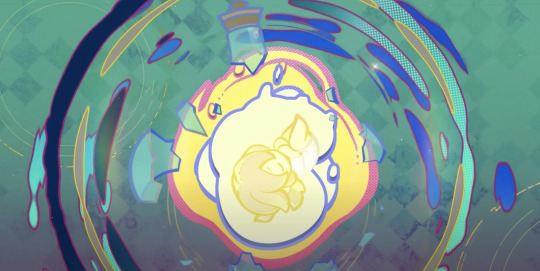
“One thought may end all calamity, and there will always be thoughts that may transcend time.” -The Meaning of Aeons
“Separate the dust in the flames with joy, and extract the exquisite from the crude. For all in the universe comes from a single source, and all things may be derived from a single thought.” -Cinnabar Spindle
I’ve been wanting to do some Rhinedottir speculations for a while. With the new Ancient Colors world quest in Fontaine, I think now is a good time to propose a theory about this mysterious member of the Hexenzirkel, her approach to alchemy, and the reason she is a “sinner,” especially within the context of one of the Archon Quest’s central questions: what does it mean to be “born with sin”?
SPOILERS: Up to Act II of the Fontaine AQ (just Primordial Sea stuff), and Ancient Colors.
Although Rhinedottir is never mentioned by name in Ancient Colors, all of the signs of her are there: Mamere’s identity as an artist, Elynas’ otherworldliness and similarities to Durin, and the differences between the Melusine’s perception of the world and our perception of it (or their aesthetics, which we will touch on later). Ancient Colors is trying to remind us of Dragonspine and, if you were playing during this time, Shadows Amidst Snowstorms, and I believe it is doing so because it is key to the secret of the Primordial Sea and the prophecy of Fontaine.
We’ve heard Rhinedottir’s perspective only twice so far, and that was in the Windblume festival from this last year and in Cinnabar Spindle’s lore. Though we still don’t know much about her, she does identify herself as a “mother” of many children, and that she is raising the only son she has left. This, of course, is Albedo.
We also know that she is considered a "sinner" at the center of the Cataclysm who unleashed "an army of shadowy monsters" onto Teyvat, but we have very little grasp of what exactly is meant by "sinner," and what if any consequences this label has had on her since then. Although every Hexenzirkel witch will undoubtedly be very important to uncovering the truth of Teyvat, Rhinedottir presents a particularly interesting case as the only one whose activities may have caused cataclysmic destruction, as opposed to Alice's general mischief and strange sense of humor.
It’s almost nothing to go off of, but I hope to demonstrate in this speculative theory that it’s more than enough to arrive at some answers.
Psychoanalysis 101, Round 2
To better explain what Durin, Elynas, and Rhinedottir’s other children are, we need to use an analogy rooted in Freud’s psychoanalytic theory of dream interpretation. This is a super TL;DR version of it and way oversimplified, but if you’re interested I wrote a more detailed theory about the significance of dreams in Genshin that has a full explanation of it there. (Also, it should be said that these were just Freud’s theories, please do not take any of the following as an accurate description of the human psyche and how it works. We are just having some fun for the sake of media analysis.)
Freud thought that dreams are the mind’s means of expressing unfulfilled wishes, and that the psychological purpose of dreaming is to “fulfill” those wishes. In A General Introduction to Psychoanalysis, he gives an example of this through a little girl’s dream where she was sailing on a lake: this dream was born out of an unfulfilled wish in her waking life, where she had to stop sailing on the lake despite wishing to continue. Hence, “I wish to sail on the lake” becomes “I am sailing on the lake” through the dream.
Further, Freud thought these unfulfilled wishes are “forgotten” in our unconscious mind when we are awake, censored by the ego to protect our conscious mind, but that at night this censorship is weakened. This is what allows a dream to occur while we sleep.
These unfulfilled wishes are often more complicated than a childish wish to keep sailing on a lake. Think about it this way: a wish is, at its core, a thought in our head, or a desire. What do we do with the thoughts we don’t like, the ones that are unbecoming of us or are unacceptable to fulfill?
We deny them.
Specifically, we repress them into the unconscious, where they are forgotten. Thing is, even if we temporarily forget these thoughts, they won’t just disappear from existence - they fester in the unconscious, waiting to be expressed. The dream, therefore, is the unfulfilled wish/repressed thought’s attempt to cross the boundary from the unconscious mind into the conscious mind - to be acknowledged, or indeed remembered.
“Unfulfilled Wishes”
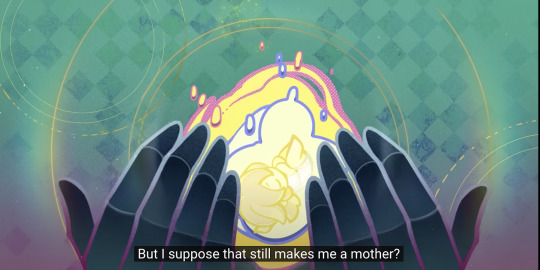
Making sense so far? If so, try to think of Teyvat like this: everything that is visible, everything above ground that the light touches and that can be perceived is like the ego and conscious mind. All of these things are what you’re aware of, things that you “know” and can make sense of, things that you understand, things that fit into rules and laws and order.
Now, think of everything in Genshin that is “unseen” and “unknown”: the Abyss, the spaces underground, forbidden knowledge, things that are “not from this world,” from beyond the firmament…these are like things from the unconscious mind, the repressed thoughts that we deny in ourselves because they may reveal a truth we are unwilling to face. These things are comparatively chaotic in nature, things we’d rather avoid, or things that we wish to forget.
We know that Elynas’ and Durin’s bodies are composed of matter that’s foreign to Teyvat, and that this is a major reason why they are incompatible with Teyvat and cause its destruction. This would make them more similar to a repressed thought, something that we don’t understand or know, and attempting to understand it destabilizes our sense of self, our “truth.” It follows that their home, the Abyss, is most similar to our unconscious mind, and Teyvat is most similar to our conscious mind.
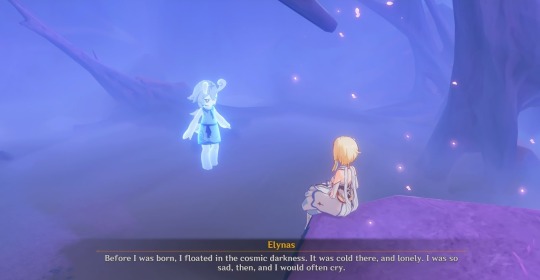
Elynas: Before I was born, I floated in the cosmic darkness. It was cold there, and lonely. I was so sad, then, and I would often cry.
So, as their mother, who or what is Rhinedottir in this analogy? Well, we can be a lot more specific than calling her a “sinner.” In fact, she’s a dreamer, and alchemy is the medium through which she “dreams”:
This was a story from long ago...
Unborn life, unfulfilled wishes,
Tragic dreams at the edge of the universal darkness that could never come true,
Indwell my body, and descend unto this world.
Then, my lovely children,
Like rainwater flowing into creeks, and plants growing towards the sun,
Go unto a lovely place, and display your own beauty there with pride.
This is a memory, a memory that a child named Durin had of his mother…
"Thank you, Mother, thank you."
"You gave me wings to soar and a mighty form."
"Mother, I wish to go to a land of lovely songs,"
"I will tell them about you, Mother, and about everyone else."
"I shall tell them that the place where I was born is beautiful."
-Festering Desire
Rhinedottir’s children, then, are like thoughts or ideas that she is bringing to life, or “making conscious,” by moving them from the Abyss to Teyvat. It may even be the reason why the sword from The Chalk Prince and the Dragon is called Festering Desire in the first place - it’s a reference to the idea of repressed thoughts, wishes, and desires festering in the unconscious.
Should the analogy hold true, it provides some insight into what her intentions may have been in creating her Abyssal dragons. But before that, we need to take a little detour into Enkanomiya and brush up on some lore.
Denouement of Sin
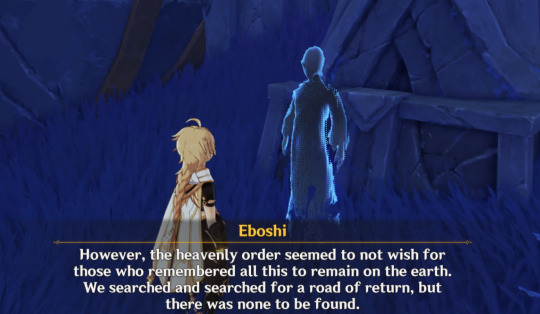
Eboshi: However, the heavenly order seemed to not wish for those who remembered all this to remain on the earth. We searched and searched for a road of return, but there was none to be found.
Remember these hologram-looking dudes? They are the Shades of Tokoyo, also known as Sinshades. They are described as afterimages of the former citizens of Byakuyakoku preserved by Istaroth’s favor, specifically those citizens’ most powerful emotions, and they are only visible during Evernight:
Eboshi: Due to the phenomenon known as Sinshades, the “past,” “history,” and “truth” of Enkanomiya would endure even if left to their own devices.
Eboshi: As such, great effort was expended, not that we might remember, but that we might “forget.” Lady Sangonomiya was of this view.
Like a dream, Sinshades only appear at night, and they are a kind of embodiment of history or “truth” that Watatsumi Island has chosen to forget, representing the thoughts and emotions of those who once lived in Enkanomiya. Using Freud’s theory of dream interpretation as a framework, Enkanomiya then functions as Watatsumi Island’s unconscious mind.
Put another way, if all Sinshades are the result of strong emotions preserved in time through Istaroth’s favor, then those emotions are like thoughts, and that would make the Sinshade a “physical” form or expression of those thoughts. So, when we call the afterimages the “Sins of Tokoyo,” we are in effect calling them the “Dreams of Tokoyo,” because they are the thoughts and emotions of Enkanomiya given form, and that’s what dreams do: they convey thoughts and feelings through a series of images.
Through the Sinshades, we see an implicit association with the concepts of dreaming and sinning in Genshin’s worldbuilding, and through them we understand that they are not so different from one another.
A Brief Note on Aesthetics
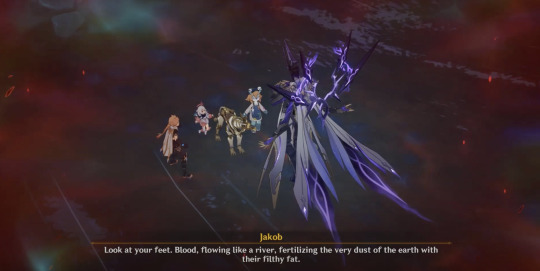
Jakob: Look at your feet. Blood, flowing like a river, fertilizing the very dust of the earth with their filthy fat.
It may have struck you how various Melusine perceive reality in a way that greatly differs from the things we see, as if at times their perception was “flipped,” if not somewhat strange. By the end of Ancient Colors, it’s clear that this is due to the Melusine being born of Elynas, who is not from this world. A similar phenomenon can be seen in both Durin and Elynas, the former imagining itself dancing with the people of Mondstadt before it “woke up” from this dream to Dvalin’s fangs in its neck, and the latter realizing that the things that it finds fun are destructive and harmful to the people of this world.
This is a part of the commentary present in several world quests and commissions in Fontaine that deal with “aesthetics,” or one’s own sense of beauty. Aesthetics are principles that differ on both large and small social scales, varying between groups of people and between individuals (see Salsa’s and Ubu’s aesthetic disagreement), and they can change throughout time as values change. In other words, they are informed by perspectives.
For example, think of what we know so far about the Primordial Sea. Neuvillette wonders how the Primordial Sea could be capable of giving life and then “suddenly reversing itself” so that it instead “devours life,” but this is just his judgment of what the sea does, and ultimately his perspective. Many others view the properties of the Primordial Sea differently from him: to them, the prophecy is comforting because it signals a “return,” or a “homecoming.” To take it a step further, Neuvillette may be making an assumption by stating that the sea has reversed itself. Perhaps this is just how the sea is, perhaps this is its “truth.”

Verenata: The "truth" will not be limited or constrained by the eyes and perspectives of the viewer, and won't be distorted by what is in their heart. It objectively exists, and it just is...like the white sand, like the bones of seastars, like the waves that crash and pound...those are "truth."
Now, imagine that you are staring at a 3D object from a 90 degree angle. If I ask you to describe the object from where you're standing, you'll be able to accurately tell me about what roughly half of the object looks like, but you won't be able to accurately describe the other half of it without help from someone standing on the other side of the object.
But how can you be sure there even is another side of the object, or that it's any different from the one you see now? From your perspective, what is already visible to you may seem sufficient to describe the object in its entirety. In other words, your perspective becomes your "truth."
It is only through considering additional perspectives that we broaden our own understanding of reality and expand on our "truth." However, broadening our perspective is usually not a comfortable experience, as is typical when we engage with ideas that differ from our own. Part of expanding our "truth" requires us to shatter our current understanding, pick up the pieces, and reassemble them into a shape that makes space for these other ideas and their "truth."
For example, when we confront Jakob at Elynas' heart, he describes the rushing currents beneath our feet as Elynas' blood. To the player, who has been swimming around in that for a couple of hours by that point, this idea is macabre and horrifying. However, when we consider Jakob’s perspective, his “truth,” it also expands our understanding of Elynas as a being that is somewhere between dead and alive, sleeping if you will, and that he is more than capable of waking up from his slumber with the appropriate stimulus. Another example is Canotila, who saw the wasteland in Rene's Book of Esoteric Revelations as a peaceful forest. When we consider Canotila's "truth," her aesthetic sense doesn't change the way we see the wasteland, but it does show us something equally important: the way that we experience the wasteland is not the only way it can be experienced.
If we return to the other ever-present metaphor of alchemy as a form of painting, we can see that Rhinedottir’s aesthetic sense greatly differs from what is acceptable and compatible with Teyvat. But, just like Mamere, she paints regardless of whether her paintings are understood by a greater audience. In time, Teyvat's "aesthetics" may change again, and perhaps her "art" will be received differently when that time comes.
Concluding Thoughts
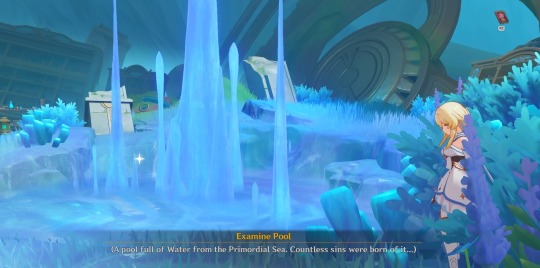
(A pool full of Water from the Primordial Sea. Countless sins were born of it…)
So, that is why I think Rhinedottir was deemed a sinner. She sinned by “dreaming” up these chaotic life forms that were not from this world, bringing them into being through the Art of Khemia, and telling those chaotic life forms that they were beautiful, too, that the ordered and lawful world of Teyvat just needed to realize how beautiful they were. Maybe Rhinedottir was dreaming of a new world, one where her children’s wishes could be fulfilled, where they could exist with everyone, and maybe creating that world required the destruction of this one. You could also think of her as someone who has introduced “external variables” into Teyvat, which, hmmm..:
“...No matter how many times I derive it, the result remains the same, though this result is not expected... Unlike the world depicted in these ancient texts, there will be no more new civilizations born... Unless we consider introducing "variables" from outside the system... If it was that sort of power, there might be a chance…” -Enigmatic Page I, Book of Esoteric Revelations
In this way, her “children” (thoughts) were all “born with sin,” or are born from sin (dreams). If Rhinedottir is a dreamer, then alchemy is the way that she dreams: it allows her to give forms to these thoughts. And if you buy that, then there are some serious implications to consider from this whole notion of Fontainians being “born with sin,” and just what exactly the Primordial Sea might be. Definitely something to think about while we wait for 4.1.
One last point that is more of an aside than anything else: Rhinedottir’s only remaining child is Albedo, but through this lens we see that he is not just the culmination of the Primordial Human Project, the creation of a human through the power of alchemy, but also the only known example of Rhinedottir’s “ideas” that coexists with Teyvat as it is now. As for her known extant grandchildren, they have integrated with Fontainian society and don’t seem to cause them any trouble. I wonder if she knew something like that could happen?
But…that’s just my take on it so far. What do you think?
(also, fun fact: there is a parallel storyline to this one unfolding in Honkai Star Rail right now as it relates to being deemed a “sinner” for creating life, and another parallel storyline in Honkai Impact 3rd about creation and rebirth and “returning home to the sea” and I just love when Hoyoverse connects their games like that)
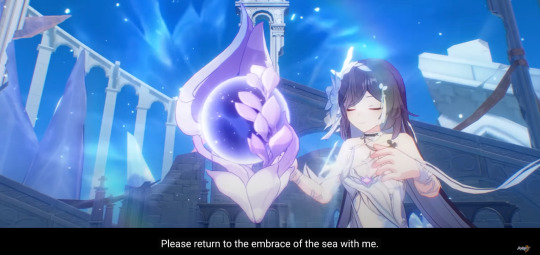
EDIT (9/8/2023): Touched this up a bit and made some grammatical corrections. Thesis is the same, some added support and re-phrasing was done to better convey it.
Sources
A General Introduction to Psychoanalysis by Sigmund Freud
#genshin impact#genshin lore#genshin impact lore#genshin theory#genshin meta#genshin impact meta#fontaine lore#rhinedottir#theory#elynas#durin#melusine#long post
228 notes
·
View notes
Text
some notes on the wanderer/scaramouche's characterisation~

i first and foremost made this for myself since every time i touched upon the wanderer's speech something felt amiss. but i also hope these notes may be of help to any content creator in their characterisation of our favourite an-emo boy!
while writing these notes i went through phrases scaramouche/the wanderer utters to establish his choice of words and thoughts that may be hidden behind them! i also provided utterances themselves for almost every point i made so that his speech can be copied easier. besides, i tried to guess how this can be utilised in our head canons! :)
please keep in mind that these are still my notes of something that stood out to me, not absolutely everything. additionally, i still may misinterpret something + our interpretation may be different + you can see something as a stretch. that's ok! also, i listened to the english va + i speak of the balladeer and the wanderer as Two Different hypostases of a character, not the same continuous character.
hope you find it helpful!

INVERSION OF GENESIS.
★ when the balladeer/the wanderer is angry, he rarely raises his voice. he starts to whisper and even speak softer instead (it's about the english voice, but afaik it's also true for other voices, too). when he wants an emphasis on certain words, he whispers, too. this isn't true for battles, though, as he is very loud in his wanderer and shouki no kami hypostases.
★ his usual sarcastic structure is to state something he'd expect and then illustrate that someone is acting against it (as in, stupid). e.g. «ah, so if it were up to you, you'd finish the job? guess i had you all wrong. there i was thinking you were just getting cold feet,» «it's not every day you see people questioning the god of wisdom's judgment. just when you think you've seen it all.»
★ when he wants to threaten a person or make them do something, he isn't necessarily uses imperative sentences. he uses «i'd like you to» in «in return, i'd like you to answer a question for me» and still gets what he asks for. other examples are his «so why don't you relax your guard a little?» «let's cut each other a little slack, shall we?» and «so maybe you should think about backing off a little.»
as illustrated, instead of describing painful consequences, he undermines them instead. («a little» is his favourite word, it seems.) as evident later, it is coupled with his, err, laid back attitude towards threats to him. basically, he just lets people act stupid and walk into his traps.
from what we've seen from dottore, he also uses the same structure: «i suggest you keep your true feelings to yourself.» maybe, he was the one scaramouche copied.
★ overall, his sarcasm is what you'd usually see from people. it should be kept in mind that sarcasm is his initial response and he will use it as often as possible even if he could simply explain. there won't be any examples here, though, as there would be too many. but his conversations with nahida, paimon and signora illustrate it well. i believe sarcasm is his way to assert power since it builds on «common knowledge + the inversion of that» hence implying the opponent doesn't have this common knowledge -> they are stupid, he is not.
★ he is extremely professional and focused on completing the task successfully. he knows how operations (which the traveller suggests he was assigned when he was the harbinger) are carried out and follows the strict algorithm. e.g. «(to nahida) we will now proceed to the heart of irminsul», «permission to begin searching for information?»
he isn't easily swayed when he works and tries to get this attitude out of the traveller and paimon, too, just asking them not to fall behind.
★ he follows the agreement with nahida: how they will walk into the irminsul and what his tasks will be. he completes them without any chatter and keeps nahida updated as he should. even after the revelation about the tatarasuna's history, he still is able to proceed with his task.
★ «you can't have your prisoner knowing too much,» «i understand that prisoners have to put up with harassment from the guards,» it may be a stretch, but from these sentences + how he talks about his relationships with the fatui i can conclude that he easily justifies abuse towards himself. the balladeer/the wanderer isn't the person who just lets people do that, but whenever abuse happens, he easily explains it by the natural order of things and weaklings suffering from the strong ones because they deserve it. hence, whenever he ends up being the weak one, he believes he deserves this abuse. this can seep through into in his further interactions with people who care about him should any fight occur.
★ «sometimes it's you using them, other times it's them using you.» it comes in a direct parallel to niwa's words about dottore's attitude towards kabukimono: people of tararasuna didn't want to use him, hence it's the doctor who altered scaramouche's perception of human relationships. the balladeer/the wanderer believes in mutual gain and uses it to: 1) get what he wants from the traveller, 2) pay back for nahida and the traveller's help.
thus, it's safe to conclude he uses this principle as a moral compass in every social interaction he comes across. he could use this law to navigate his personal life instead of his emotions.
★ «most of human relationships are this way… certainly the stable ones are.» it is easier for him to predict when he stops being valuable to someone and toss other people out when they are not useful to him, so there is no sudden abandonment. it is easy to see how it corresponds with his trauma. this principle gives him the illusion of control since he can calculate everything, and gaining control over situations that may lead to the repeated trauma is a response real abuse survivors have. hence, it's safe to conclude the wanderer will try to find what other person gains in his more sincere relationships and, what's worse, may use other people who care about him out of habit since it's a natural order for him.
★ even though he earned the reputation of someone who doesn't bite his tongue when he should he doesn't backtalk or lie when it isn't beneficial to him.
★ he admits to managing «cordial conversations», so while the wanderer may avoid participating in small talks at all, it isn't unreal to picture him having one and not imploding. this is also something confirmed by his first appearance in the unreconciled stars event where he handles a friendly conversation perfectly - so the friendliness is just something he knows (and studied intently as kabukimono) but ignores on purpose. social skills are there.
★ the balladeer and possibly the wanderer, too, is sadistic in a classical sense of the word. he admits to enjoying stomping on the pests, meaning bringing pain and destruction to people. this can also be confirmed by one of the husk of the opulent dream's pieces. there, it is stated that «he also loved watching expressions of terror and helplessness play across human faces, and it was perhaps precisely because of this imbecilic underling's expressiveness that he had kept them around.» as the balladeer, he let some of his subordinates stay not because of their usefulness, but because they were funny to abuse. (also. hot.)
thus, it can be possible that in a less hostile environment of the akademiya the wanderer can struggle with this side of himself, hurting people on purpose. this can also become something he has to fight in relationships with people he cares about.
★ before his memories are restored the wanderer is polite and reserved. he apologises, calls his boss properly and tries to do his part. we can notice the similar behaviour of the balladeer but weaponised to imitate friendliness (e.g. unreconciled stars). there isn't any features of a classical shy character, he doesn't stutter or use abrupt phrases.
★ «i ran into him out in the wilderness during the storm, and he let me take shelter in his cart. in return, i said i'd be his helper for a while.» even before he gets his memories back and remembers principles the fatui likely taught him, the wanderer navigates his relationships with others through understanding what he gets and what he must give in return.
it is clear that he spent some time in the shop already and made enough work to make the merchant uncomfortable for exploiting him. thus, the «for a while part» isn't quite true. the wanderer has nowhere to go so he has every intention to pay back more than he needs to, to just stay somewhere.
hence, he can continue using this principle in his relationships with others, creating a conflict where he is dead set on paying back with little to no regard for his own feelings.
★ «i don't deserve your protection.» it seems that even before he restores his memories and is only told about his sins, the wanderer already despises himself enough to reject help. this attitude may exist later, when the wanderer restored his memories, with an added «i'm not that weak» but this is only my speculation.
however, this phrase may be another example of him carefully weighing what others give to him and what he should return.
★ «(uttered by the jester) what you are, truly, is a weapon, one that can be wielded with an iron will…» to further ingrain the thought that the balladeer is a tool, not a person, the jester proposes the idea of seeing himself as a weapon to kunikuzushi. coupled with dottore saying someone will eventually use kabukimono, it seems this was the strategy that was used to keep the balladeer in the harbinger ranks.
thus, we can see that the balladeer continued to suffer abuse due to 1) his beliefs in the strong dominating the weak, 2) his illusions that he is a person shattered by events of tararasuna, hence he perceives himself as an object, a weapon that must endure. the latter is a bit of a speculation but i don't think it is far off the mark:
★ «now that i've had a taste of just about every flavour in this world, i've found that actually… bitterness is the one i like best,» and the whole bitterness discussion in the teapot are the example of him pushing himself to his limits in order to being able to handle the true bitterness of life. (also, it lies in a nice parallel with ei/shogun's «illusions shattered» thing, but i diverge.)
★ «(uttered by the jester) or, you could continue to drift aimlessly.» another tactic fatui used to win kabukimono over was his obvious lack of any goals and place to go. we can see that the wanderer finds himself in a similar position, staying with the merchant because he had nowhere to go. long time ago, the balladeer stayed for these very reasons with much, much more dangerous people than a common merchant.
★ «i'm harsh on myself and everybody else.» while the former comes from the low self-esteem and believing himself to be weak, the wanderer also won't be patient with anyone's blunders. i suspect especially if it's about someone in his charge or if it's about work. i also suspect that an easy way to get on his good-ish side is to act this way as well and not let any mistakes slide.
★ «utility to others is what makes me worth.» as soon as his memories were implemented into him, he is reverted back to his harsh principles ingrained into him by the fatui. it seems there isn't any other tool he could use to measure his worth. the base principle that any life is worth something does not exist for someone who didn't see himself as an alive being for several past centuries.
hence, it can lead to reckless behaviour driving him to his limits which will cause stress to someone who cares about him.
★ «oh right… i almost forgot. you're the good guys. you're into justice and all that.» this is his answer to the traveller trying to argue with how the wanderer sees his own worth. i believe there's some division between what he thinks good guys deserve/what the wanderer himself deserves. thus, while it is possible he will agree that life's worth is life itself after some long argument, he still won't apply this to himself. i believe it's a somewhat common coping mechanism to think «people don't deserve X, but i deserve X.» (i'm not talking about his crimes, btw.)
★ «no nonsense. i like it.» he approves when the traveller doesn't argue with the «let them stab the blades into my chest if they so desire. maybe that's how it always should have been.» while the wanderer might need support in his life and changing his self-destructive perspective might be of great help to him, it seems he still wouldn't appreciate a direct approach to that.
VOICE LINES.
★ one of the most consistent features of the wanderer is despising the idle chatter, as evident in this idle voice line, «it's rather pathetic to force a conversation just to occupy silence.» another example is the husk of opulent dream's description: «the youth, hating chatty humans the most, gave his subordinate a backhand slap.»
so, the balladeer/the wanderer despises small talk even if he can participate in one. he would likely appreciate people who are just focused on the task and don't say anything that isn't related to their common goal at the moment. perhaps, it can be used to form a wordless bond between him and people who hang out with him.
it seems that he is quite harsh in his criteria for the idle chatter since his subordinate asks quite a normal question of where the harbinger is heading next.
★ looking through every voice line about other people, it can be argued that the wanderer's initial algorithm to describe someone is to trash them. but i believe we should also remember most of his voice lines are about the harbingers, and he's never had particularly warm feelings towards his colleagues. other four are yae miko and raiden shogun, and he isn't fond of them both, and kazuha and nahida. last two are the only people he doesn't despise, and these voice lines are pretty tame, while not an open praise.
★ «i have no need for food. save me the trouble and take care of yourself and that small thing floating next to you.» this can be perceived both as him not wanting the traveller getting in his way like the balladeer's subordinates, or genuine, poorly expressed care. thus, the wanderer may say dubious phrases with that intention whenever he expresses his care.
★ «so, you're still stewing over our run-ins from before? huh. well, what are you going to do about it? take your time. i'm in no hurry.» the wanderer's attitude to threats is quite unique. other examples of that are his lines from the trailer, where he answers «sure i will» and «i look forward to that» to the threat that he will pay for his attitude. also, «fine by me – come one, come all, i say. as a matter of fact, i'm somewhat looking forward to it.»
basically, you can read his behaviour as «you can be stupid enough trying to attack me, and i won't stop humans from being stupid, and the outcome is their fault.» it's basically all over his trailer where he waits until the fatui attack first.
★ when it comes to answering for his sins, though, i would rather see it as accepting his punishment. it is also evident in his falling voice line, «the price for my sins.»
★ «the gods aren't guided by any kind of rationality or moral compass. haven't i shown that to you already?» i believe he doesn't mean ei or nahida here, two archons he is connected with, because he didn't show us anything in regard to them. (we dealt with problems with them ourselves) what he might mean is shouki no kami. this also may be evident in his battle ost and, «(about his actions) after all, gods have never been needed to be reasonable.» so this phrase may indicate irony he feels regarding his actions as an archon.
★ overall, it seems that he's rather profiling everybody for us rather than giving his pure opinion.
★ «anger, whether it be from others or myself, is too convenient and useful as a tool.» while the balladeer went as far as becoming a god only to become emotionless, he now learns an actually legitimate way to deal with anger. the first step to do it is to learn that anger is a normal emotion and how to channel it instead. thus, he can also learn this about other emotions and that each one of them is ok. knowing he uses the utility of everything as a compass, the utility of emotions may be something that will help him accept them.
★ «don't you know that's only asking for trouble?» coupled with the phrase from his birthday letter, «has she ever stopped to think about what an «experience» it is for others to meet me?» it is apparent that while behaving highly unsociable due to detest for idle chatter, he also wants to shelter others from his presence since he believes it is nothing pleasant. i believe he also thinks it will only bring suffering in the end – to them.
★ «it's not so much that i have nothing to say… i just have nothing fun or positive to share,» explains another reason he avoids conversations – he just doesn't believe himself to be someone people would usually have as an opponent.
★ «if you don't mind, perhaps… we could sit here together for a while,» coupled with «the scenery here should be quite breathtaking» from his birthday voice line lets me think that his favourite quality time with others is to peacefully enjoy some scenery (he truly is a cat who just likes to be in someone's presence).
★ «are you so dumb as to have forgotten that i'm not human?» this is a less useful observation but i find it rather funny that he is annoyed not by the fact that the traveller may try to poison him but by the fact that they chose an ineffective method. if we wanna extract something useful, though, it can be said that if the traveller tries to kill him and fairly wins, he is ok with that as he is the weak one in this situation. but that's quite a stretch.
★ «i can see the great deal of effort you put forth,» «thank you for trying to look out for me. go get some rest,» and «it's generous of you to host me in your home. the least i could do is be grateful,» show pretty clearly that even after the wanderer restored his memories he is still able to express gratitude without exploding, and i don't believe he finds it useful to be mean when it isn't of any need.
★ «hey, you own this place. what are you so nervous about? it's not a good look,» coupled with «look at me, coming around here, criticizing your lifestyle choices.» everybody noticed how nice the wanderer is in the serenitea pot (as shown in the previous point). but this also reveals that while he enjoys being painfully straightforward and kept people around just because they suffered prettily, he doesn't enjoy when at least the traveller doesn't put up any fight. maybe it's about the subordinate/the equal difference. basically, he seems to respect people with strong personal boundaries. the ones who don't try to justify their own home where he is just a guest, at least. that would be logical since it's evident he navigates his life through «weak/strong» division.
★ «this is your home. arrange it as you wish,» this and previous voice lines illustrate once again that he isn't unnecessarily mean, at least not all the time. he understands the dynamics of a place he is in and how to be a grateful guest instead of shitting on every player's choice.
★ «the fact that things didn't work out doesn't make my past self a fool for hoping in vain that they would, does it?» and «you're a god. do you think i'm evil?» depending on whether we see the former as rhetoric or not, this may show that even though he is quite old, he still looks for guidance whenever it comes to more vulnerable topics. he looks for this guidance in people he respects, such as the traveller and nahida. and at least with nahida, he listens intently because the answer truly matters to him. maybe, if there wasn't any mechanic restrictions, he would listen to the traveller, too.
PRE-IOG SCENES.
★ «for just a small price, they get the feeling of controlling the world. trading their life for supreme power… pretty good deal, don't you think?» there isn't much to analyse as the utterance is pretty clear, but i just find it funny because this is what he ended up doing with shouki no kami. so either he fell into the same trap or he truly believed in what he said then and wasn't just mocking teppei.
★ «[haypasia] peered into my consciousness and saw my past. someone like that is qualified to become my first follower.» while this qualifies haypasia as a follower, having one also qualifies him as a god. but this can be perceived differently. haypasia saw his past and stayed devoted and didn't leave her god. it is my speculation, but this may be something scaramouche is after - this is a twisted form of acceptance. as the wanderer, he still may harbour such desire to be seen and accepted, leading him into healthy relationships or unhealthy obsessions. still, the whole haypasia sequence demonstrates that scaramouche is still a loyal individual, he just didn't have anyone to grant this loyalty.
★ on the same note, it should be said that scaramouche openly admits and expresses affection to haypasia. a mortal, a feeble human, mind you. because, of course, she is his first and only follower. thus, he can show such feelings honestly and without shying away if he deems it necessary, which might be useful for creating his future bonds with other people and maybe he will be much more open with them than we'd initially thought.
★ «has anyone ever told you that you're not good at sowing discord?» and «you're still too naive if you think a few words will be enough to convince me to destroy the doctor,» imply that before the revelation in 3.3, scaramouche wouldn't let just anyone get him on bad terms with the doctor and manipulate him into that no matter how much abuse by dottore he endured. no matter how bad his relationships with his colleges are, he will handle them himself. this is a note purely for me and my future writing of the wanderer, but it seems that even after 3.3 getting him out of the dottore's mental grasp will be a demanding task.
SMALLER DETAILS.
★ his idle emotion and his character picture are him smiling, so it isn't unusual for the wanderer to do it and even more natural - maybe, at least when he is alone.
★ whenever the wanderer finishes the task, he prefers to shortly say «done» without any chatter.
★ when it comes to speech, he doesn't divide his sentences much and uses compound, very complex ones freely. whenever he needs to explain something, if it isn't something he deems stupid, he does it fully and doesn't hold back.
★ scaramouche always calls nahida buer, perhaps as the way to show himself being above «demon gods», while the wanderer calls her lesser lord kusanali, which sounds more respectful as it is her title.
★ overall, i think the approach hoyo use for their characters is choosing one main characteristic (if you think about any character, you can remember One main thing about them) and then building their interactions around situations where it feature shows and situations where it is an exception and they act against it.
if we focus only on one type of these situations, we mischaracterise the character. thus, if we choose, say, the wanderer being mean as his main feature and focus on it, we miss out on times where it isn't true. for example, his respect for the traveller's realm or his desire to help others in a parade of providence. if we focus only on nice exceptions like that, we mischaracterise him as well.
updates:
★ now that we have both the second birthday story and his tcg lines, it appears to the wanderer is no stranger to doing something just to make someone happy. and then say it was only because he's got nothing to do. e.g., reading books someone recommended to him, «some vahumana students were trying to push some book recommendations onto me. i don't have anything else to do, so i'm just idly flipping through them» or playing a duel because he thinks it makes the traveler happy, «can a game like this really make you so happy? childish... if you want to play, then be quick about it,» «all smiles after winning a game like this? ha, so easy to satisfy,» «and the boring game is finally over... you happy now?»
#genshin impact#genshin#scaramouche#kabukimono#wanderer#genshin impact meta#writing#dottore#nahida#my post
170 notes
·
View notes
Text
The Mystery of Fontaine and Furina and Others;
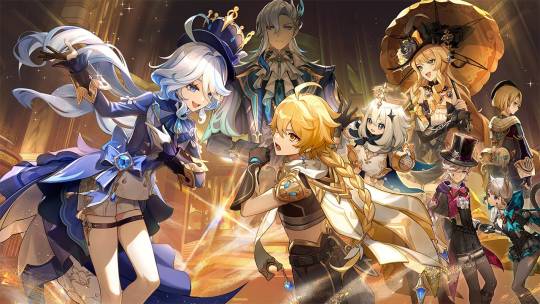
I love the concept of hydro, its about justice, its about drama and most importantly, emotions. (Region is inspired from France). It makes sense because justice is about empathy, about caring about victims, its about emotions but sometimes, its also related to sempaty, the drama, because thats what happens when you are overflowing with emotions. Which perfectly fits Furina, the Hydro Archon. She is very emotional character but she hides that side of her for the sake of her land. She seems full of herself from outside but actually, very insecure and sensitive. Its important to remember that we didnt meet the Furina when she is not on public yet so we will see.

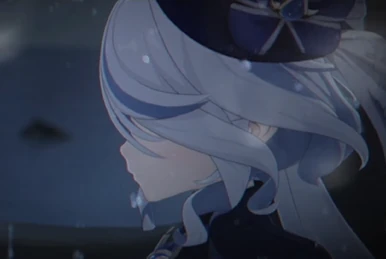
This sitution is most likely, its related to prophecy. I wonder, the reason is trials? The way trials work? The sin might people seeing other people's misery as entertainment or maybe the mysterious Oratrice, that somehow knows who is guilty, who is innocent. Maybe Furina was very afraid of not finding true justice, very scared of sending innocent people to prison, that she started to rely on this machine but it end up resulting water's overflowing? Furina seems to know why or at least has an idea whats going and she seems to handling things on her own way but it seems to fail miserably. Or maybe this land suffers from self-fullfilling prophecy. They or Furina believe and pay attention to prophecy too much that they unconciously turn it into reality. Maybe its related to 'overflowing emotions, the tears'. Furina's design is, her necklace, especially her eyes are include tear design too so yeah.
Freminet talks about Furina in his voicelines;
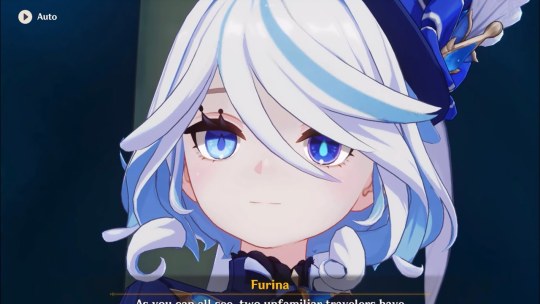
'Uhhh...I am in no position to give a well-rounded opinion on the Hydro Archon..so......I'll pass..I mean..I've only seen her a few times..So I am sure I have a..somewhat skewed view of her.'
'Okay…Fine…I've seen what the Hydro Archon's like when she's sitting in the audience…In my view..she's a very charismatic speaker..But its her silence that intrigue me more…Her eyes..They are like the darkness at the bottom of ocean..Hiding a-deep secret..afraid of anyone ever getting close to her…Uhh. Sorry..I…I let my imagination get better of me...'
(Source)
First of all, kudos to Freminet for being the only person who actually understand Furina, somehow.
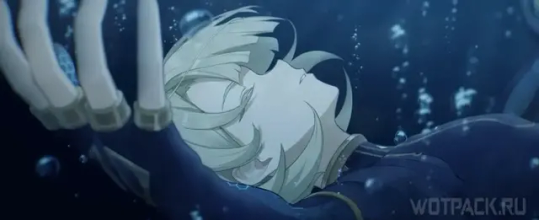
All this talk about Furina by Freminet and the trailer picture might be important clue in the future. Maybe Freminet will be one of the first ones who will find out Furina's secret.
Lyney mentions that his 'naive' brother Freminet believes in fairy tales' in his voiceline but i wonder what is this fairy tale he is talking about, maybe it is really true and its related to Furina's secret, as reference to Furina being fairy since her design also resemble it.

This hydro archon quest is really dark, both with people turning into water as experiment and Lyney and Lyneytte's backstory. While they might be good people (which we can see with their relationship/gratitude with Cesal) and they still have their own agenda as fatui members.
We dont know what Arlecchino is planning but Wanderer and Childe said she is wolf in sheep clothes in his voice lines so most likely, she uses twins and other orphans for her plans but we will see. Its also interesting that every fatui member is doing something? with their own homeland. Signora with Venti in Mondstad, (Not sure about Liyue part), Scara with Ei in Inazuma, Dottore with Nahida in Sumeru and now, Arclecchino with Furina in her own homeland Fontaine? I wonder this is all planned by Tsaritsa or she just lets them take revenge on their homeland as they please. Well, we will see.
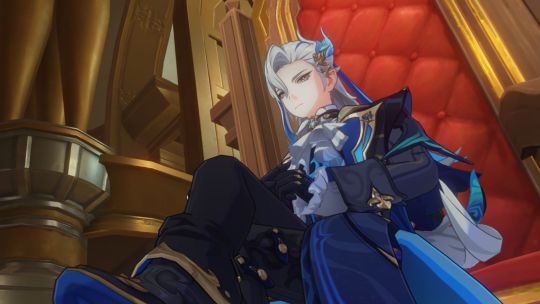
Neuvillette is really look and act like Hydro Zhongli. I thought he might be Edgeworth like Ace Attorney Game since game is turning into one (more realistic version, thankfully but he seems softer than he looks, maybe more mature version of him). He seems a lot more human/passive than it seems but also powerfull secretly. Its also been theorized that he might be hydro dragon, elemental creature and if thats the case, he seems to hiding this for some reason, (wonder if he hides this from Furina too), and he secretly cries/being sad and thats why rain starts.And i think its worth to remember that for some reason we never see 'guilty/not guilty' results, he is the only one who looks at results or maybe there are no results at all and he makes it up? If he is elemental creature, he might also be related to Primordial sea or at least, he might know something about it. We will see.
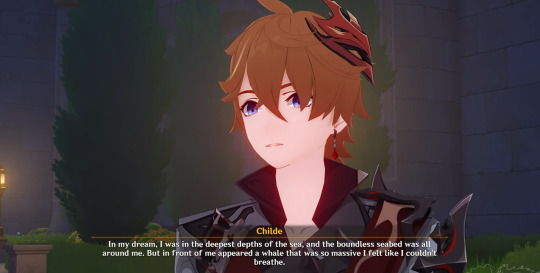
And Childe backstory, him somehow awaken something and it seems to be relating people's disapperance with water. And his dream in deep sea. Very interesting. I love how he randomly shows up and meets with traveler and he sure is close to being one of the main characters in the story. And the fact that he will stay in prison until 4.1-4.2 is very funny, lol. You wait for us, Childe.

And my general opinion about the characters; I really love Furina, just like Ei, she is very interesting deep character. She is also very entertaining and i love her design. She is my favorite archon. Cant wait to get more of her. I like Lyney, Lynette and Freminet but for now, i love Lyney the most, compared to them, he is such a cute, gentleman. Childe is of course, one of my faves and he definitely should interact with Furina and others more, lol. I am notr with Neuvillette and Clorinde and cant wait to find out about them and his dynamic with Furina. Navia is design is very good and character too but i wish she get less screentimes in archon quest since this is not Navia quest, lol. Generally, i love the animation, characters, music, concept, and story. And hydro is my favorite element, i love everythig about it. Anyway, we will see with other characters/things later so for now, thats it.
#genshin impact#fontaine#furina#focalors#neuvillette#ace attorney#crossover meta#genshin impact meta#lyney#lynette#freminet#traveler#childe#arlecchino#genshin impact analysis#fontaine spoilers#navia#game#hydro archon#genshin lore#genshin impact theory#archon quest#cesal#clorinde#dottore
134 notes
·
View notes
Text
Childe: Raises a sea monster against Liyue "It will be fine, Morax will come and protect everything"
Zhongli: Yes it was just a test
Furina: The sea is swallowing Fontaine "It will be fine! I, Focalors, will fix everything!"
Arlecchino: Are you fucking sure miss
#childe#tartaglia#zhongli#furina#arlecchino#the parallels are funny#childe is a war criminal#zhongli is kind of an a*hole#furina did nothing wrong#arlecchino did nothing wrong#genshin impact#genshin impact meta
27 notes
·
View notes
Text
Lyney & Traveller thread
This (long)thread will focus on their relationship, following with Lyney’s voice lines AND also those of the story/archon quest. I'll show you what I think of them and why Lyney x traveller has become one of my favourite ships.
(Last update : 4.1 quest )
•★ Summary :
1. About Lyney and the Traveller’s actions
2. Archon quest 4.0
3. Lyney’s story quest
4. Archon quest 4.1
5. Lyney’s voice lines (+ Chinese translation)
6. Teapot voice lines
7. Conclusion
——————————————————————
/!\ Please note: You don't have to agree with everything I said if you don't have the same opinion. Here, I'm just sharing what I think and just analysing. I'm not very good at rewording and my English is not that bad but if I've made mistakes…. I apologise, English isn't my first language.
——————————————————————
• About Lyney & the Traveller’s actions
So as you all knew, Lyney and Lynette are members of fatui, and the traveller will have complicated feelings towards them. Just to reminder, I don't think the traveller was upset just because they were fatui.
( And stop with '’why is the traveller all friendly with Childe when he too is a fatui???'’. First, the traveler knew Childe long before Lyney. They even have a fight, they had to deal with him in different places etc... and yes, the traveller also has a ‘soft’ spot for Childe thanks to his story quest + voice lines(companion). They've literally dealt after Childe for several meetings and spending time with him, whereas Lyney has only been there for a day(?), with some interaction before the magic show. I also remind you that the traveller is still wary of Childe sometimes. (Ex: Yoimiya, Xinyan…) They’re not all ‘BUDDY BUDDY’ with him.
What I also mean is that we need to spend a lot of times with a ‘suspicious’ person to fully ‘’trust’’ him.) and the traveller is not always pacifist, they have character development. Remember, they dealt with the Fatui and had the most difficult times. (Scaramouche, Signora ….and Dottore too).
• Archon quest
I think the reason why the traveller was upset was because :
Lyney and Lynette didn't say they were fatui from the start, knowing the Fatui are there for the gnosis and bad intentions. Perhaps the traveller thought that Lyney had approached them for bad intentions as fatui (but that wasn't Lyney's aim at all).
I also think that since the traveller was their defence attorney they didn't have all the information and their client didn't tell them everything. (Basically: You shouldn't deceive someone when they’re trying to save you/defend you if you understand what I mean.) When your client held VERY crucial information, especially on the case, the traveller had the right to be upset at the twins. It’s all about betray/lying and trust, and I’m not mad at the traveller. They have the right to be suspicious/not trust and forgive them easily, it’s totally understandable after the trial.
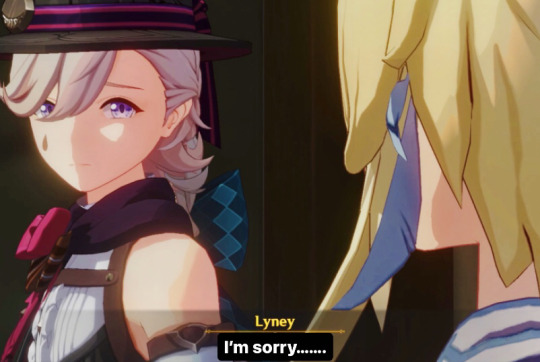
Lyney and Lynette thought they could get away without mentioning their real identities, but they didn't. If Lyney didn't mention his identity it's because he knew that first, the traveller had already dealt with fatui (he just wanted to have a good times with them but...), and second, knowing that the fatui are known to be a ‘’evil’’ organisation. The traveller has already experienced with the fatui and all have the same motivations(bad intentions), they can't really believe the twins easily even when Lyney told them that they aren’t bad guys and aren’t like the others. Anyway, the traveller defended the twins until the end after knowing that they were Fatui.
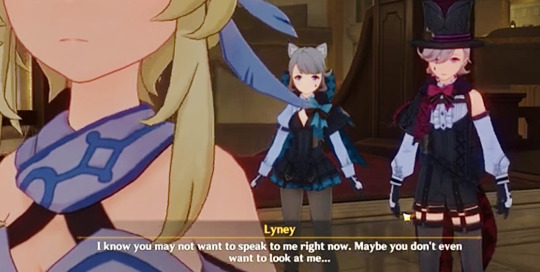
(The tension between them here..... Why do I feel like this is some kind of break up lol?)
The traveller leaves and wants time alone after what happened but here, Lyney stops them. It's clear that he doesn't want things to end like this, so he thanks them and apologises, but above all he's there to make things clear. He did not approach them for evil intentions, on the contrary, he just wanted to get to know them and be friends with them. As he mentions, he spoke to them as himself, as 'Lyney'.
That's where Lyney tells their sad past. A lot of people see the traveller as ignorant and they are mad at them for not trusting them, especially with Lynette’s story (and still with the ‘’ ALL BUDDY BUDDY’’ with Childe crap.) I want to make things clear : they're right not to believe the twins yet. Yes, they feel bad for them and I think they even believe or want to believe their story, but after what happened, they're hesitant because they don't want to fall for another lie… Seriously, can you blame the traveller? But for now, they leave because they heard enough and want some time alone to think about it.
When they were about to leave, Navia came and talks about the disappearance case. But the traveller apologises and tells her that they were only trying to defend Lyney. If you say that the Traveller doesn’t care about him then you’re wrong. Yes, they’re still upset and hesitant but deep down, they wanted to defend Lyney to the end and also because they didn't want to see an innocent man accused.
——————————————————————
• Lyney’s story quest
Their next meeting is in Lyney’s story quest, and you can see the awkward moment after what happened in the trial :
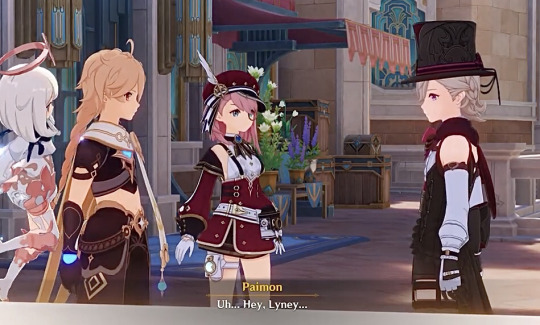
Lyney greets them as usual (like he did at their first meeting), avoiding the awkwardness of course. But think about it, the traveller saw Lyney, they could have ignored him but decided to come to him : they want to speak to him and spend time with him. Maybe, they wanted to ‘’trust’’ him again and reconcile with him. Well… they decided to help him with his investigation as his assistant. (maybe Lyney also wanted to get a little closer to them, who knows?)
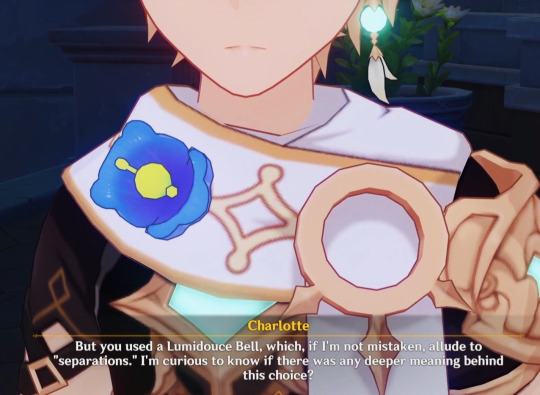
If you think this is just a ‘’flower’’ then you’re wrong. Lyney knows what he’s doing especially when it comes with his magic tricks : this flower is called ‘Lumidouce Bell’ and this flower represents : parting and the wish for reunion.
That’s not a coincidence right? Of course not, particularly with the ‘wish for reunion’…. I don’t need to explain that, because the answer is there.
- Anyway, I won’t spoil everything about his story quest but I will concentrate at the end of his quest
So, we learn a little more about Lyney and his relationships, also about lies and truths… Lyney opens up a little to the traveller, and they begins to understand him a little and supports him. Yes, they have reconciled. But that doesn’t mean that the traveller trusts him completely but they are there for him as a friend, like in their first meeting.
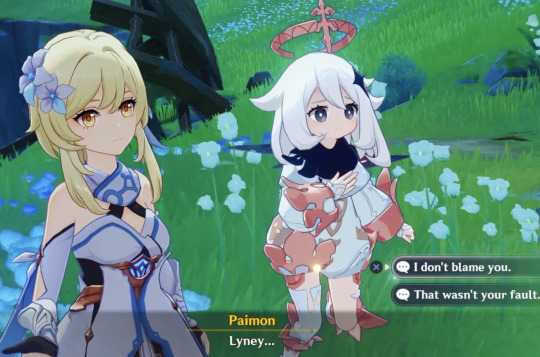
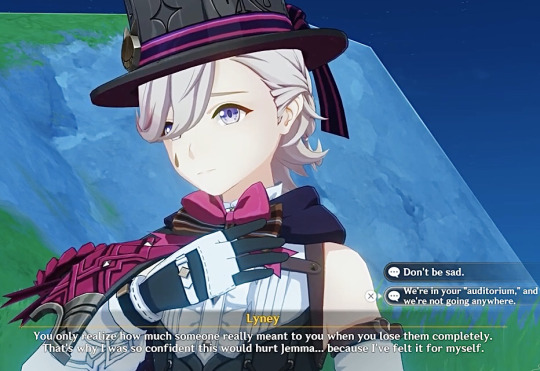
The traveller comforts Lyney and tells him they will always be there for him. Right after this, he decides to change the mood and he gives another flower :
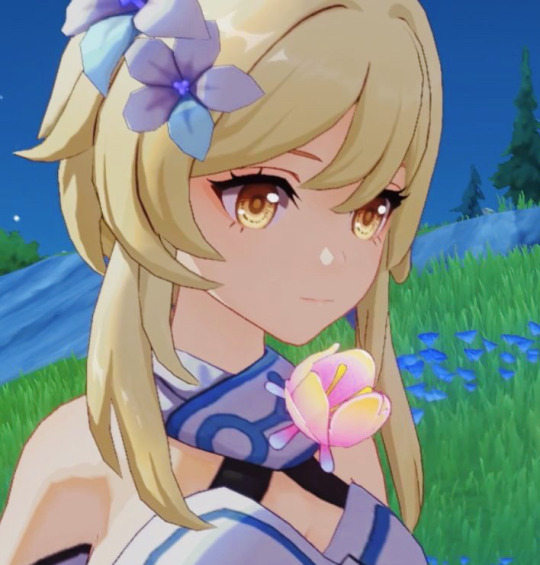
But it’s a different flower : this flower is called ‘Rainbow rose’ and knowing Lyney, what he gives, has a meaning behind it. The rainbow rose represents : passion and romantic encounters.
Wow, is this a coincidence or not? Lyney knows what he’s doing through action.
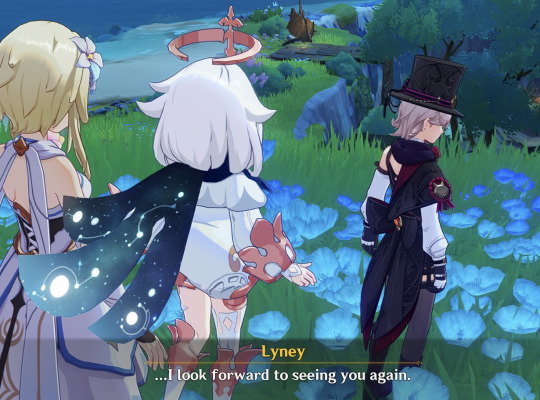
Anyway, here comes the funny part :
We meet Lyney again with Lynette and Charlotte. You know charlotte, she's here to interview. Anyway, the funny part is when Paimon mentions the Rainbow rose that Lyney started to use in his tricks. ( Traveller)
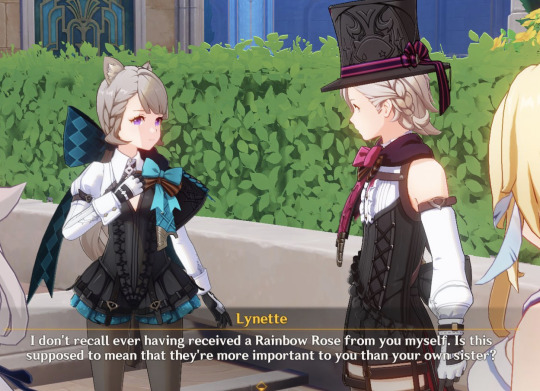
But, Lynette doesn't remember receiving this kind of rose from her brother(yes, she knows the meaning lol), she jokes if the traveller is more important than her. So, Lyney didn’t say anything to Lynette and didn’t give this kind of rose to his precious sister? Well well, that is something.
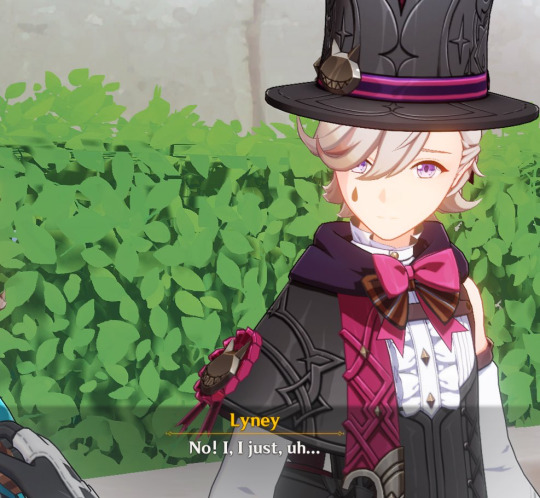
And Lyney’s reaction lmao 😂 He doesn’t know what to say. Come on Lyney, you have to take responsibility for your actions. Yeah, you JUST what Lyney hm? He knew what he was doing smh. He literally did the same trick his teacher did to his fiance… In romantic sense yeah.
Anyway, he’s lucky because Lynette said she was joking and he was relieved. Why are you relieved Lyney? I wonder…. He could have justified himself ‘’easily’’ , but he was nervous and hesitated to do so. Well, I know it’s not easy for everyone to justify themselves but you know what I mean?
Finally, Lynette tells the traveller not to lose the Rainbow rose or she'll be very upset, not to forget that she knows the meaning.
Welp, I suppose she supports Lyney x Traveller ?

Yeah, it seems like it.
—————————————————
• 4.1 Archon quest : here
—————————————————
• Lyney’s voice lines
Ah yes…. The FAMOUS voice lines. As you can see, almost all of them are flirty towards the traveller. I suppose these voice lines take place after the archon quest and his story quest since they have ‘reconciled’ and Lyney is more open to the traveller. And oh my god, he’s the most flirtiest guy I’ve seen (for now).
Here, I take both Chinese and English translation. No worries, I’m not saying that the English translated it wrong but just a few voice lines where it's kinda different but they are both the same and flirty.
*・゜゚・*:.。..。.:・*:.。. .。.:*・゜゚・* *・゜゚・*:.。..。.:・*:.。. .。.:*・゜゚・*

(Chinese translation)
Lol, he wanted to sleep a little more but when it was the traveller who came, he quickly stand up and was wondering why the sun was so nice…. Yeah okay nice flirt, the traveller is a sunshine : confirmed ✅
*・゜゚・*:.。..。.:・*:.。. .。.:*・゜゚・* *・゜゚・*:.。..。.:・*:.。. .。.:*・゜゚・*
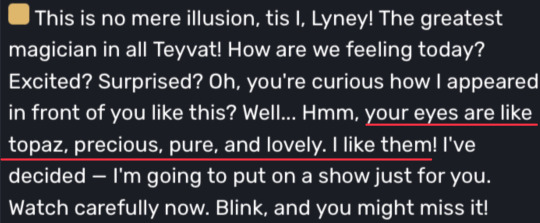
He really observed the traveller to the point of comparing and describing their eyes? Is he attracted to the traveller? Maybe that’s why he decided to be with them and to put on a show just for them.
*・゜゚・*:.。..。.:・*:.。. .。.:*・゜゚・* *・゜゚・*:.。..。.:・*:.。. .。.:*・゜゚・*

Nice flirt Lyney. Of course, it's the traveller, yeah of course
*・゜゚・*:.。..。.:・*:.。. .。.:*・゜゚・* *・゜゚・*:.。..。.:・*:.。. .。.:*・゜゚・*
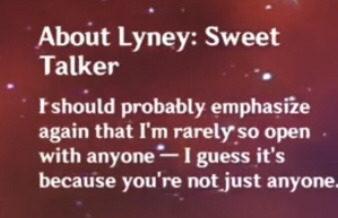
Chinese translation : Ah right, there is one thing that I must emphasize. I don’t talk like ‘that’ to anyone, mainly because it’s you.
Here, he clearly said that he doesn’t talk like ‘’that’’ to anyone. (I assume he means by talking all friendly and flirty). Perhaps that’s why the title is : Sweet talker ✨
(the English one is great too)
*・゜゚・*:.。..。.:・*:.。. .。.:*・゜゚・* *・゜゚・*:.。..。.:・*:.。. .。.:*・゜゚・*

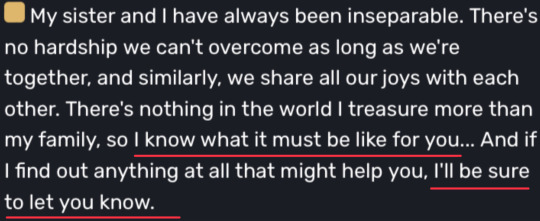
We can see that Lyney cares a lot about the traveller. He’s doing his best to not hurt them and to not mention their sibling in the discussions. He understands the traveller’s pain and will do anything to help them. *sigh* He’s very sweet…
*・゜゚・*:.。..。.:・*:.。. .。.:*・゜゚・* *・゜゚・*:.。..。.:・*:.。. .。.:*・゜゚・*

Lyney… just admit that you want them to be your apprentice and call you ‘Master’ especially lol. He’s very curious if the traveller will understand his secrets and how long they’d last… Geez all right Lyney!
*・゜゚・*:.。..。.:・*:.。. .。.:*・゜゚・* *・゜゚・*:.。..。.:・*:.。. .。.:*・゜゚・*

Not only that, Lyney is also interested and wants to know more about the traveller! He doesn’t plan to lie of course, he said it himself that he doesn’t want to hurt them again.
*・゜゚・*:.。..。.:・*:.。. .。.:*・゜゚・* *・゜゚・*:.。..。.:・*:.。. .。.:*・゜゚・*
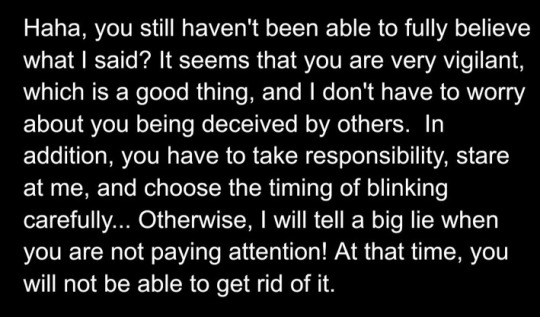
(Chinese translation)
I love it, It shows that he is worried about the traveller being deceived by the others. Annnd again, he wants them to stare/look at him carefully or he will tell a big lie when they aren’t paying attention…. As you know, this is not the only voice line but here, he really wants the traveller to watch him very carefully……. Yeah, all eyes on him and not anywhere huh?
*・゜゚・*:.。..。.:・*:.。. .。.:*・゜゚・* *・゜゚・*:.。..。.:・*:.。. .。.:*・゜゚・*
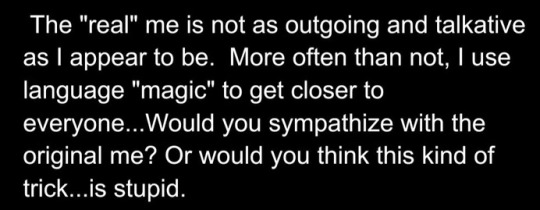
(Chinese translation)
When I said that he opens up to the traveller and trusts them, it wasn’t a joke. Enough to the point of telling them that this is not the ‘’real’’ him, by saying that he isn’t that outgoing and chatty, so he uses magic to approach people. In the CN voice, he takes a breath and asks them if they would sympathize with the ‘’real’’ him. If you think about it, this is sad. I hope one day, the traveller will want to know the ‘’real’’ him and accepts him. (I know they will.)
*・゜゚・*:.。..。.:・*:.。. .。.:*・゜゚・* *・゜゚・*:.。..。.:・*:.。. .。.:*・゜゚・*

(Chinese translation)
Okay, how many times already? This guy really wants the traveller to only think/look at him and not to think troublesome thing in front of him. This is too much, I know what you want Lyney!
*・゜゚・*:.。..。.:・*:.。. .。.:*・゜゚・* *・゜゚・*:.。..。.:・*:.。. .。.:*・゜゚・*

This one made me laugh. Literally, the food that the traveller made was terrible and Lyney, who doesn’t want to hurt them, decided to do a magic trick lmaoo. This is so funny help but he’s so kind geez…
*・゜゚・*:.。..。.:・*:.。. .。.:*・゜゚・* *・゜゚・*:.。..。.:・*:.。. .。.:*・゜゚・*

Welp, the traveller has managed to capture the magician's heart… He even congratulated them for doing so. Lyney really fell for the traveller huh? Welp. Guys, I think someone has a crush.
What I find funny is that Lyney doesn’t hold back anything and says what he feels to the traveller, even his past, ''everything''. Don’t tell me he’s not ‘’attracted’’ to the traveller because all of those voice lines are impossible to deny, especially with all those flirts. He really tries to capture their heart too? I wonder….
————————————————————————
• Teapot voice lines
Haa, the place where the traveller invites someone into their home and they stay for some time….
When the traveller comes, in CN voice, you can hear that Lyney sounds very happy to see them. This guy really likes to see them everyday huh?
Anyway, the same in the teapot as the voice lines, he wants to win back the traveller's trust (it’s very important to him) and even tries to test them by saying whether he is lying or not.
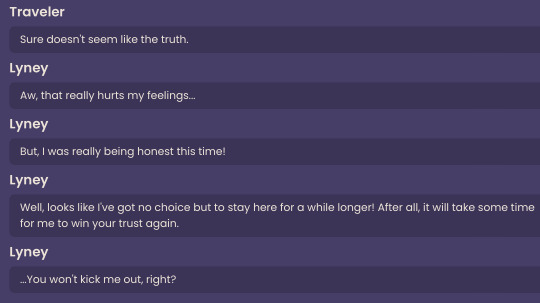
When the traveller doesn’t fully trust him yet, he is hurt but we know Lyney, he doesn’t give up. Of course, it will take some time as he said but he also takes his time to get close to them because he doesn't want to put pressure or force the traveller to trust him… I mean, that’s not Lyney. (Kinda cute how he’s kinda scared(?) that the traveller will kick him out lmao. 😭 )
*・゜゚・*:.。..。.:・*:.。. .。.:*・゜゚・* *・゜゚・*:.。..。.:・*:.。. .。.:*・゜゚・*
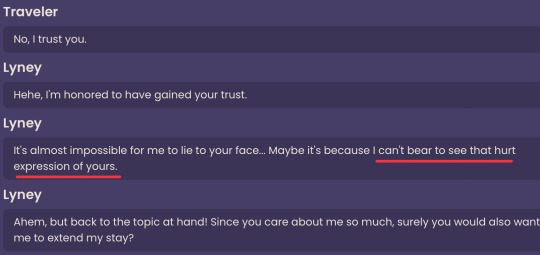
When the traveller trusts him, look at him : he’s happy, all he wanted was to win the traveller’s trust. As I said earlier, he doesn’t lie to them anymore (?) because he can’t bear to see that hurt expression of them. See? He really cares and it hurts him to see their hurt expressions after what happened at the trial (I mean, of course he doesn't want to do the same thing again). This also means that now, he is ''honest'' with them almost all the time! And obviously, he wants to stay with them because he enjoys their company.

*・゜゚・*:.。..。.:・*:.。. .。.:*・゜゚・* *・゜゚・*:.。..。.:・*:.。. .。.:*・゜゚・*

So here, Lyney stole something from the traveller. And if they respond ‘’my heart?’’, look at what this magicien says. Yeah : ‘’even my heart has begun to race too’’. Basically, he wasn’t ready for that answer that his heart has begun to race. SERIOUSLY. I’m telling you, this guy is in love AND HE DOESN’T EVEN HIDE HIS FEELINGS.
*・゜゚・*:.。..。.:・*:.。. .。.:*・゜゚・* *・゜゚・*:.。..。.:・*:.。. .。.:*・゜゚・*
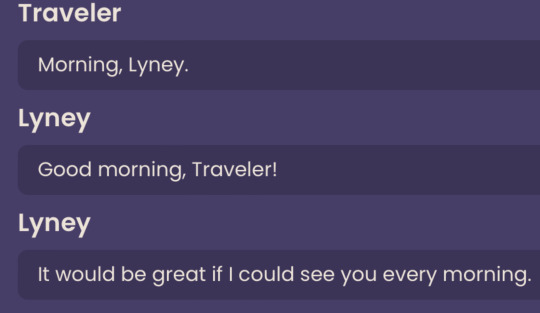
He wants to see them every morning… LIKE HELLO??
Remember the ‘good morning’ voice line? Dude wanted to sleep more but when it comes to the traveller, he immediately woke up. When he said that the sun was so nice? But that was because it was the traveller who came? And here, he said it would be great if he could see them every morning?? Literally, the traveller makes Lyney's day even better and puts him in a good mood. (Traveller is a sunshine ✅)
————————————————————————
• Conclusion
Now you understand why I ship them? All the proofs are here, and you can’t change my mind. This magicien who hides secrets, tells lies and doesn't open up easily to the others(except Lynette)... has opened up to someone : the traveller, where they barely knew each other. He decided to stop ''lying'' to them, and became honest as he shares his feelings, tells a little more about his past with Lynette, and is always happy to do something for them etc….. If that’s not ‘’love’’, then I don’t know what it is. He even starts flirting with them almost all the time, hmm I wonder why? I mean, he doesn't hide how he feels about them, like come on! Did Lyney fell in love at first sight or what is it? We can clearly see that he became attached to them (as for every characters ofc).
Every time he flirts with the traveller with his magic tricks and his words and whatever, I’m just like : JUST CONFESS ALREADY LOL
-> To be honest, the tension between them was intense and deep. And when Lyney was really sorry and wanted to regain the traveller’s trust… that just made me feel bad for him 😭. He even said that if that wasn’t for their identities, they could have been good friends without problems. You know that it wasn’t his intention and he really tried his best to reconcile with them (Well, they remained friends despite their identities!).
You know…. Something like that is perfect for fanfictions am I wrong? I think that Lyney x Traveller is great for angst…. Sorry I love the angst, please don’t hate me. 🙏
————————————————————————
Anyway, I congratulate you on having read this far. I don't usually do this kind of post but this ship really got me and I couldn't stand seeing people misunderstand the traveller towards Lyney. Nevertheless, I’m happy that they have ''reconciled'' ♡. Even if the traveller still doesn’t trust him completely, they’re still interested in him and want to know more about him.
Hope to see more fanfictions and fanarts of them!! (Because I’m starving rn… GIVE ME FOODS RNNNNNNN THIS SHIP NEEDS ATTENTION.)

#genshin impact#lumine#genshin lumine#genshin aether#aether#genshin impact thoughts#genshin impact theory#genshin impact thread#genshin impact analysis#genshin impact meta#genshin impact ship#genshin thoughts#genshin theory#genshin meta#genshin analysis#genshin 4.0#genshin 4.0 spoilers#genshin impact 4.0#genshin spoilers#genshin impact spoilers#lyney genshin impact#genshin lyney#lyney#lyney x lumine#lyney x aether#lyneylumi#lyneyther#lynlumi#lynther
77 notes
·
View notes
Text
Xingqiu fans are dining excellently with all the references to him and lore regarding the Guhua Clan being spotlighted via Chenyu Vale's "A Wangshan Walk to Remember." The comparisons that can be made between Xingqiu and his predecessors is also very fascinating...
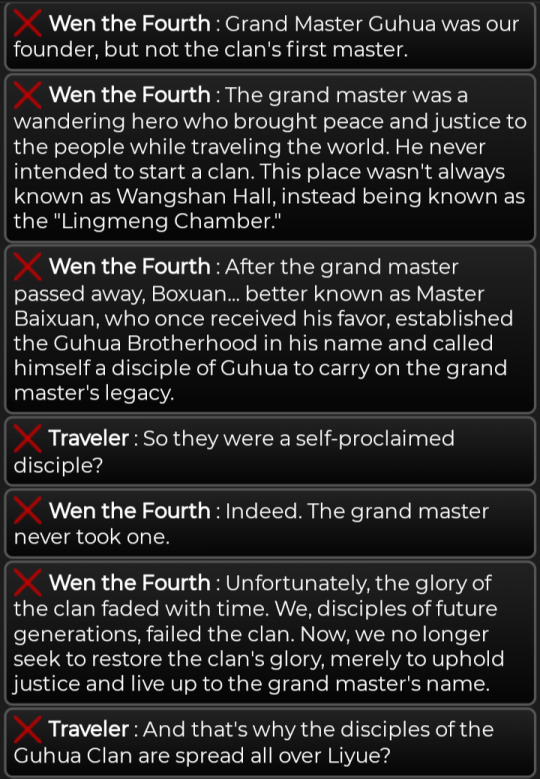
The Grand Master Guhua truly did live out the life of idealized dignity and transparency just as Xingqiu desires for himself. There's something very touching and heartbreaking about the fact that Guhua's life was one deemed heroic, but he was only able to have his legacy carried on by Boxuan who cast his own name aside to exhalt the name of the deceased Guhua.
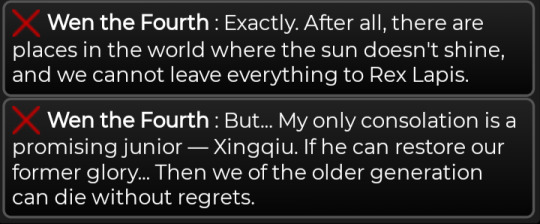
And then right after briefly recounting the life and works of Master Guhua, Wen brings up Xingqiu, reemphasizing the lofty ideal/hope that he can respark the dying flame of the Guhua (no pressure) and potentially act as a parallel to the founder of the art himself. It's made all the more poignant, considering that we could easily draw the connection that Chongyun could be considered Xingqiu's potential Boxuan equivalent, a fellow young practitioner of martial arts who acts as a peer and supporter of Xingqiu's arts (although lets hope Xingqiu doesn't die preemptively like Guhua did).
I don't have snippets of the dialogue for it or screenshots, but those books in the archive room were just so lovely to see. The fact that many of the old disciples of Guhua were just nerds like Xingqiu and enamored with wuxia novels, shelving their discussions of them among all of the records they held in their library was so sweet.
Additionally, the person who invented the Rain Cutter technique that Xingqiu uses now was the one involved with the hidden Wangshan chambers that had the really forboding message about the heavens rejecting humanity and whatnot... very mysterious stuff.
Additionally, those 5 swords scattered around Chenyu Vale, the first of which you find at the outskirts of the Wangshan Chamber....while not necessarily all individuals of the Guhua Clan, it made me oddly emotional to see how the years that went by, depicted by each sword's material- from a blade to a crude sword shaped stick- and yet they all had in common a very poetic observation of their goals and the world about them that could easily flow as a singular nature/travelling-based poem. And that spirit of poetry intertwined with swordsmanship flourishing across the ages still continues on with this one dorky rich boy. It's honestly wonderful worldbuilding, that through environmental storytelling and the mere mentions of a character who was never even present for the entirety of the world quest, all of these stories and records of Guhua disciples and swordsmen before him tell me all I need to know about Xingqiu as a character, too.
#definitely would like to do more rereading of the texts within the Guhua library + those weird inscriptions#these lore drops were so cool#currently caught up in the profound nature of multiple generations united in their love for art- poetry- swordplay- idealism of heroism etc#the joy of community but also the loss of having a space in which your passions can be taken seriously and allow you to grow into the#desired version of yourself#the fact that xingqiu is considered a light in the darkness for the current Guhua elders yet he practices his art as part of a double life#all while the wangshan chamber crumbles- very symbolic#suppression and isolation kills passion#genshin impact meta#semi incoherent most likely as I am sleepy but I had to get my thoughts out#genshin impact#genshin 4.4#genshin 4.4 spoilers#xingqiu#a wangshan walk to remember
20 notes
·
View notes
Text
Zhongli, Selflessness
I really love that a quality we see consistent in Zhongli is that he is kind. Zhongli is a lot of things- hard not to be when you're an immortal who's lived thousands of lifetimes, been through years and years of hardship and faced the best and worst of yourself and of everyone you know- but something that's just so consistently Zhongli is how selfless he is. How kind he tries to be. Perhaps age has softened him- but I like to think that this was just an inherent quality of his character, that his selflessness has always been him, even if Zhongli himself does not realize it. I think this kindness is what Guizhong sees in him, what Xiao sees in him, it's why the adepti believe in him, it's what venti and the other original archons trust he is despite everything they have been through. It stands out, even in his worst moments, Zhongli himself would always reach out to the light and choose to relearn kindness, in the end. His kindness doesn't come from being naive, but rather the opposite- he's seen terrible things, and so chooses to be the light. He refuses to grow jaded, even when many think it is impossible not to. Even in moments when he could not afford to be kind- he will always choose redemption, choose selflessness and kindness all over again.
28 notes
·
View notes
Text
blah blah counterpoint and variations; character demo predictions
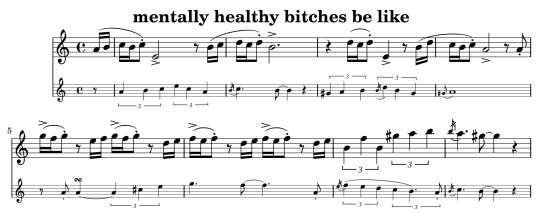
(mentally unhealthy bitches be like a funerary march on the lower end of the piano)
#genshin impact#genshin ost#hoyo mix#vgm#navia#genshin theory#genshin impact meta#my writing#(so to speak)
22 notes
·
View notes
Text
the heavenly principles
If you wander around The House of Daena in Sumeru, you might find some torn pages belonging to the "Scroll of Streaming Song." And while it's all very interesting (especially the fact that it's technically an annotated translation, coming from someone deeply invested in linguistics) the relevant part I want to point to is in Vol 2.
The framing of the scroll is that there's a priestess testing a princess's wisdom. The wiki speculates these may be Greater Lord Rukkhadevata and the Goddess of Flowers, but that's not as relevant. What intrigued me specifically was her third riddle:
"What rises from the earth, then descends from the sky,"
"No one has seen it, yet it sees all,"
"As above, so below, and as at the bottom, so too, the top,"
"Yet only top to bottom may be, and never bottom to top?"
And the princess answers:
"You speak of the universal law created in heaven, the divine laws established in the beginning."
"No one has seen the eternal law, yet it governs all."
"One may only bow down and worship Vaana of the heavenly spirits — no arrogation, deception, or trickery is permitted."
"If one dares to imitate the forbidden arts, only calamity awaits at the edge of divine knowledge."
We'll break this down in a second, but I did want to mention I had a feeling that Genshin would, at some point, start talking about "As above, so below." The worldbuilding draws heavily on Hermetic and mythological influences, including demonology, so why not one of the most enduring and popular occult concepts? So I was very pleased to see that my theory got confirmed.
For some background, "as above, so below" is a paraphrase of a verse from the Emerald Tablet. The full quote is either translated as "That which is above is like to that which is below, and that which is below is like to that which is above" or "That which is above is from that which is below, and that which is below is from that which is above," depending on if you subscribe to the Latin interpretation or Arabic original.
Please note that the Emerald Tablet is an alchemy text. Interesting, right?
There are a lot of different interpretations of what this means, exactly, but The Kybalion interprets it to refer to how humans can conceptualize images in their brains so the image reflects their consciousness, so too does [higher power] conceptualize the material of the world. I've seen it interpreted as "movements on the astral plane dictates the movements of the earth" as well as more practical applications. But the jist of it that's relevant here is that the laws and conceptualizations of the heavens guide the laws of the earth, and "laws" can mean what happens, actual laws, etc. Please note that The Kybalion refers to this as a universal law, or principle.
Principle, huh?
Going back to the quote, it seems that the answer to the riddle is Genshin's Heavenly Principles. The ones that caused the downfall of Khaenri'ah, the ones Ei tried to align herself to...really, the mysterious truth that governs Teyvat. So they've established that the Heavenly Principles themselves (whatever they may be) operate based on the idea of "as above, so below." The occurrences of Teyvat must mirror the machinations above in Celestia. There's some implication here of an inherent lack of free will for those down on Teyvat, which is very interesting.
There's also the idea that the top guides the bottom, not the other way around (lol). This basically means that Celestia dictates Teyvat, and to flip this around is something heretical and perverse. Really, it's enough to get your whole country razed to the ground. Nice job, Khaenri'ah.
We already knew that Khaenri'ah did something blasphemous, and there's speculation that this was Khemia-related. Something alchemical. But this passage gives us something more specific: whoever was running Khaenri'ah (the one-eyed king, maybe?) decided they wanted to do something divine. Something that would upend the regular motion of things, something that might influence Celestia the way Celestia is supposed to control Teyvat.
We're going to be seeing a lot of Biblical analogies here in the future, methinks.
It's also interesting to note that "as above, so below" has influence in other places in Genshin Impact. Mona's astrology comes to mind--the stars above dictating the fates of the people below. Celestia above having such a chokehold on the Archons below. I can't say where this ties in with Scaramouches "THE SKY IS FAKE" thing or whatever is going on with Albedo and Khemia.
Because if making life wasn't perverse enough for Celestia to intervene, what on earth was? What could possibly subvert the law of "as above, so below?"
Just some food for thought.
#genshin impact#genshin impact lore#the heavenly principles#genshin impact theory#genshin impact meta#sumeru#Greater Lord Rukkhadevata#the goddess of flowers#sources: wikipedia the kybalion quora and just trust me bro#and quotes from the genshin wiki too
138 notes
·
View notes
Text
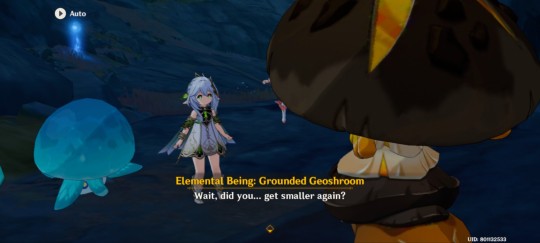
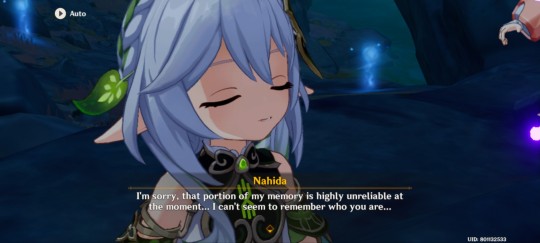


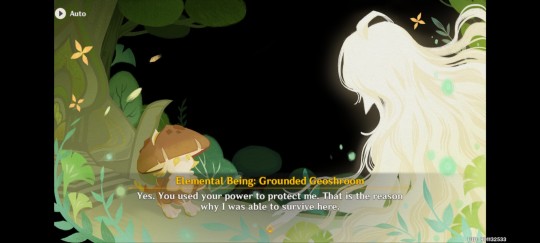

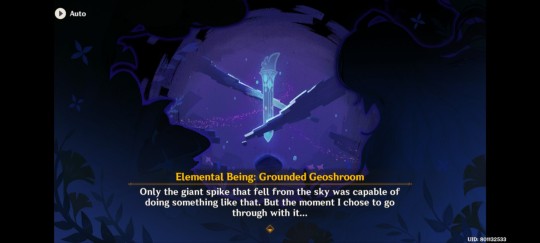
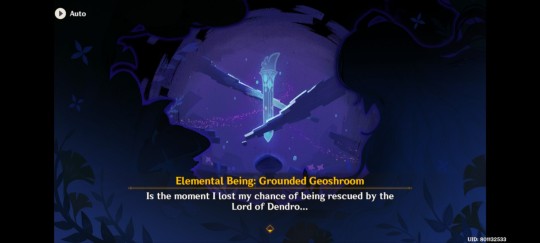
Wow, wow, okay, there's a lot to unpack here.
Rukkhadevata herself was a 'reincarnation'/'continuation' (idk how to word it sorry) of yet another forgotten Dendro Archon.
Nahida will grow into an adult like Rukkhadevata did.
Rukkhadevata was planning to wipe herself off history with her remaining consciousness for a long time.
The nails falling from Celestia presumably has a power that allows for evading the memory/history wipe, seeing that the Geoshroom remembered Rukkhadevata.
#genshin impact#genshin impact 3.6#genshin impact spoilers#genshin impact lore#genshin impact analysis#genshin impact meta#nahida#rukkhadevata#kusanali#dendro archon#dani.txt
33 notes
·
View notes
Text
You know, I've seen the idea that Crepus could have been a Harbinger, assuming Pierro, Capitano, and Arlecchino are 0, 1, and 4th seat respectively, but while I think that would be interesting, I doubt it.
See, the main crux of the argument is the fact that Crepus had a Delusion. Interesting, right? How did he come into possession of one? People will point to this as evidence for Fatui, specifically Harbinger, membership, but I think this idea overlooks something very important.
An entire plot point of the Inazuma Archon quest was the fact that the Fatui were manufacturing and distributing Delusions amongst ordinary people with a desire for power. Did y'all forget Teppei? Who died because of his use of a Delusion?
What's interesting about this is that Crepus fits this description almost perfectly. He never received a vision and was never able to join the Knights of Favonius, yet that wish persisted and was eventually passed to Diluc. Just the sort of person the Fatui would be looking for.
And its these sorts of people who wouldn't have as many reservations about accepting power from otherwise sketchy as hell sources. Nor would they be the type to easily divulge this secret.
It is, in my opinion, very believable that Inzazuma was far from the only place the Fatui ever distributed Delusions on the black market. Make money while being able to test/research Delusion on unsuspecting people and not your own troops? Yeah, we can afford to have some in circulation amongst the general public.
#just another 1 am ramble#genshin impact#genshin impact meta#genshin impact theory#crepus#crepus ragnvindr#fatui#teppei#pierro#capitano#arlecchino#dottore#columbina#pulcinella#scaramouche#sandrone#la signora#pantalone#tartaglia#childe#fatui harbingers
68 notes
·
View notes
Text
[3.8] Technology as a False God: On "Evolution," the Duality of Machines, Replication, and Wisdom
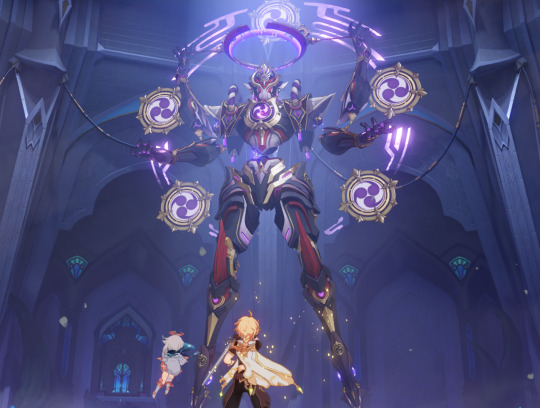
“To recognize untruth as a condition of life: that is certainly to impugn the traditional ideas of value in a dangerous manner, and a philosophy which ventures to do so, has thereby alone placed itself beyond good and evil.” –Friedrich Nietzsche, Beyond Good and Evil
Before we move on to the nation of justice, I want to do one last inquiry into the narrative significance of machines and technology in Genshin’s 3.x patch cycle. Here, I’ll discuss how divinity (or “godhood”) and technology are treated as interchangeable tools to surpass fate and the boundaries of mortality, the potential problems with treating them this way, and propose an alternative relationship between humanity and technology as illustrated through Karkata, Benben, Tamimi, and Mehrak. By foregrounding machines, we learn something intriguing about ourselves and the “truth” of this world as we perceive it.
SPOILERS: All Sumeru Archon Quests, Caribert, the Golden Slumber and one out-of-context screenshot from Dual Evidence, the Dirge of Bilqis and its post-quests, Khvarena of Good and Evil, Nahida’s second Story Quest, Faruzan’s hangout, an out-of-context screenshot from Baizhu’s Story Quest, and major spoilers for Persona 5 strikers at the end. Also some dialogue from Shadows Amidst Snowstorms and A Parade of Providence, two limited-time events from 2.3 and 3.6 respectively.
Disclaimer: I have tried my best to write this post so that it stands on its own, but because it is still a sequel it will probably make the most sense with the context of part 1. Here are the previous posts leading up to this one:
Part 0: On Dreams, the Abyss, Forbidden Knowledge, and Wish Fulfillment
Part 1: The Uncanny, Fate and the Machine
Terminology:
Machine is sometimes used interchangeably with “technology” in this post.
Technology or tool here is referring to technologies specifically used to pursue a wish like immortality in the face of existential dread, not the use of technology or medicine (which I do not address here, and is very difficult to separate from the former) to facilitate someone’s life who could otherwise not survive without that technology, or would have a more painful lived experience without it.
Also, though I don’t engage directly with “A Cyborg Manifesto” here, Donna Haraway’s ideas have greatly influenced my own over the years since I read her in college (although I mostly disagree with her on many points, or at least don’t go as far in boundary deconstruction as she does). I owe my interest in technology studies to her and that piece. Her essay is linked here and at the bottom if you would like to read it.
(and finally with many, many, many thanks to my boyfriend for multiple beta reads despite not having played a single Hoyoverse game, helping me work out the philosophy bits and contextualizing them in history, and encouraging me to finish this)
TL;DR: Machines are friends, not food!
No Matter the Cost
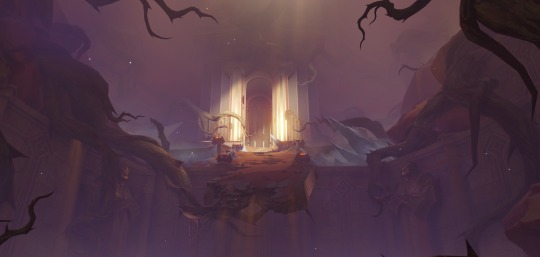
“...Perhaps it is as the notebook says, and we can find a power that transcends even that of the Abyss — the power of ‘evolution’...” -Records of Unknown Attribution (I)
“Life, death... and the world around us all follow a set of laws... Hehe, but if you never test the limits, how can anyone know where the boundaries of these laws are?” -Baizhu Voicelines, Chat: Natural Laws
“...Even the ominous thing that came down from the heavens shall be ours to use…” -Hyglacg, Shadowy Husk in the Chasm
Without a doubt, the star of this patch cycle is Khaenri’ah, which lurked in subtext and allegory in the Archon Quest, haunted Sumeru’s landscape with its massive defunct Ruin Golems, and finally smacked us in the face with its physical location in Khvarena of Good and Evil..
We already know that Khaenri’ah was a nation that put its faith not in the gods but rather in human ingenuity and technology, and that they ultimately attained a power so great that they “almost touched the dome of the firmament.” They did this by researching increasingly dangerous energy sources for their numerous mechanical creations, the Ruin Machines we are all too familiar with by now. They started out with Azosite, a Ley Line-based elemental energy source that powered their earliest Ruin Guard models, like those scattered around Devantaka Mountain.

Nasejuna: This giant furnace is used to make a substance known as Azosite. It is the core of this entire factory, and the Energy Blocks we saw earlier were derived from this place.
But this energy source proved inefficient and therefore inadequate for Khaenri’ah’s goals, which led them to seek a higher power from beyond the skies that could fuel their larger machines with perpetual energy. This likely is the bridge between Khaenri’ah’s fate and Chlothar’s mysterious remarks in Caribert about the Abyss Sibling:
Chlothar: We once believed that you would bring new strength and hope to Khaenri'ah.
Chlothar: To us, you were the Abyss... A wondrous mystery far beyond our imagination and comprehension...
Chlothar: ...And the one who controls the Abyss can control everything!
Chlothar: We yearned for that future. We looked to you to take us there.
Chlothar: But what did you bring us instead?
Though Khaenri’ah presents itself proudly as a godless nation, it may have been founded around the time when the celestial nails dropped in Teyvat’s first forbidden knowledge pollution event, which destroyed the unified human civilization. As potential survivors of this devastating act by the Primordial One, Khaenri’ahns then settled in a lifeless land without plants or animals of its own, and they hoped to build something there that belonged solely to humanity. The Heavenly Principles had turned on the world’s earliest humans, and they were powerless against them. Chlothar’s words betray the scars of this trauma on Khaenri’ah, as well as their desperation to control their fate by looking to the Abyss.
As a brief refresher from the previous part, we discussed how the German word heimlich denotes “the home,” all that is familiar and known, while unheimlich (uncanny) refers to all that is unfamiliar and external to the home, such as the wilderness. The Abyss sibling and the Traveler are external variables to Teyvat, making them otherworldly, unfamiliar entities full of potential to surpass Teyvat’s natural laws. Although the Abyss sibling is not a god per se, they were probably as close to a god as Khaenri’ah ever had, because to them the sibling embodied the higher power they were searching for, and they saw that “godliness,” a sort of functional divinity, was yet another technology for them to master. In this way, the Abyss sibling (and their functional divinity) was a powerful tool for Khaenri’ah’s desired end, the “future they yearned for,” a being who could deliver them to the end of their suffering under the Heavenly Principles.
It’s similar to what King Deshret represented to Rahman and the radicals in Archon Quest. The hopelessness of Sumeru’s situation before the Archon Quest’s conclusion is an allegory for the position humanity finds itself in under the rule of the Heavenly Principles, with the Akademiya symbolizing Celestia and the desert dwellers symbolizing Khaenri’ah. The material consequences of the Akademiya’s rule on their lives created a dangerous situation for the desert, and those most desperate to change their fate were willing to believe in the impossible:
Dehya: …The rougher life gets, the more they wanna believe in King Deshret. Way they see it, King Deshret’s resurrection is their only chance at overthrowing the Akademiya.
…
Dehya: Sumeru is run by wise and mighty sages. To them, us desert dwellers are nothing but tools that can be used and discarded at their whim.
Dehya: We’re cheap labor. Like livestock, but easier to control…Nothing more.
…
Rahman: We’ve waited a long time for this day to come… The sun and the moon no longer shine here. All you see now is cracks in this desiccated land. But, fate has finally dealt me a hand to play against the Akademiya.
Rahman: With these scholars in our custody, we’ll stomp the Akademiya’s forces and fight our way beyond the Wall of Samiel.
Like the Abyss sibling, Deshret’s divinity is both a nebulous symbol of hope and also the means to an end, a tool or “technology” for surpassing fate.
Celestia is untouchable, unconcerned with mortal lives, and the boundaries that govern humanity leave no room for them to negotiate their rule:
"Resolve, valor, love, hate...they will all twist in the river of time. But the 'rules' will never change." –Magatsu Mitake Narukami no Mikoto, Living Beings
Instead of bowing to Teyvat’s laws, Khaenri’ah pushed them to their limits. The cost of their failure spelled the end of their nation as they knew it, polluting Khaenri’ah and Teyvat with forbidden knowledge again.
And speaking of forbidden knowledge pollution, let’s talk about Apep’s role in Nahida’s second story quest, because if all that wasn’t enough, the metaphor becomes quite literal in Apep’s case. Nahida’s second story quest is many things, all of which will be extremely important in Fontaine when we deal more directly with the idea of forms, the Self, and mirror images, but its most useful application to both Sumeru’s story and the overarching main story is the allegory of Apep swallowing Deshret.
In exchange for allowing him to establish his kingdom in the desert, Deshret promised to pass all of the knowledge he learned to Apep once he died. When that day did come, Apep literally ate Deshret’s body in order to assimilate his knowledge (or memories) into its body. Little did Apep know, this was all Just As Deshret Planned, and its body became a containment zone for the lethal forbidden knowledge he accumulated after the Goddess of Flowers’ death.
Apep’s goal was, and still is, to overthrow the Heavenly Principles that took Teyvat from it and the other Sovereign dragons, and using Deshret’s knowledge was yet another stepping stone to achieving this goal. Seems a little similar to Khaenri’ah, right? It’s even in the title of its boss music: “God-Devouring Mania.” This idea of not just utilizing divinity as a tool, but also metaphorically consuming it as an energy source, like a predator would consume its prey, is crucial to understanding its purpose as an aid in a larger project of “evolution.” (Edit: in other words, it’s all about power).
Drink Not That Bitter Salt Water
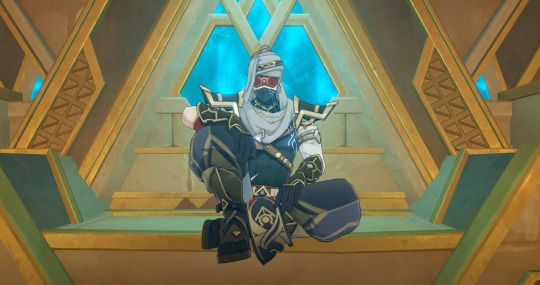
“Flesh decays, and with it decay all martial arts mastery and all poignant memories. Perhaps only by converting one’s four limbs and body into sturdy mechanical parts, and by at last sacrificing one’s very own heart for a sophisticated mechanical one, can one transcend the impermanence of the fleshly form…” -Marionette Core Item Description
“A reptile that has mutated after feeding from greater lifeforms.
Majestic beasts are sometimes revered by human beings as the embodiment of a greater power, their visages turned to analogy to feed in reference to a person, feeding their ego. However, the majority of beasts that have absorbed the "greater power" were slain by the overwhelming nature of the power itself. Only a few among their number evolved new forms.” -Consecrated Horned Crocodile, Living Beings
Video still from WoW Quests
As it turns out, the relationship between divinity and technology to humanity is not just unidirectional, but interchangeable. Let me show you what I mean.
In the Golden Slumber world quest, the Traveler wanders through the ruins of King Deshret’s civilization in search of a novel area of research for Tirzad’s paper with Jebrael and Jeht, two members of Tirzad’s hired investigation team. In the depths of King Deshret’s mausoleum, they stumble upon Samail, who is collaborating with the Fatui to locate King Deshret’s secret, the Golden Slumber.
At the conclusion, Jebrael and Samail actually reach that “place” after arriving at Deshret’s throne in Khaj-Nisut. In order to save Jeht, Tirzad, and the Traveler from the encroaching Golden Dream, Jebrael joins Samail in the sea of consciousness:
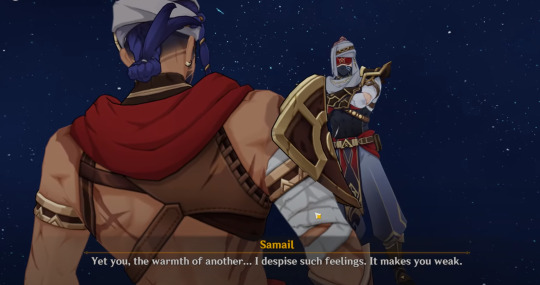
Jebrael: I'm inside... the Golden Slumber promised by Al-Ahmar?
Samail: Oh... You are not "us" yet.
Samail: ...It's fine. Soon, there'll be no "you." "You" will become a part of "us." This meaningless talk will be unnecessary then.
…
Samail: You should obey. Al-Ahmar's will is our will. The Thutmose's dreams are our dreams.
Jebrael: No! Ufairah taught me that I'm not just some part of you, I'm an independent person! I have my own dreams... I won't go back!
Samail: Jebrael, why don't you understand? Love is just a fever. I even eliminated the infection for you. Has the heat made you lose your mind?
Jebrael: You're the one who's lost their mind, Samail, not me. The Golden Slumber that Al-Ahmar promised us isn't like this... It's not a sad place with only "we" and no "I."
Samail: I'm not sad. I know what I want. My dream is to be one with the Thutmose.
Samail: Yet you, the warmth of another... I despise such feelings. It makes you weak.
Video still from WoW Quests
When they worked under Babel, Jebrael saved Samail from an assassin Babel sent in their exploration of Gurabad. Classified as traitors of the Tanit, Samail and Jebrael then founded the Thutmose Eremite faction together and were the only meaningful connection each other had until their first attempt to uncover Deshret’s secrets. On this expedition, Jebrael met Ufairah and had their daughter Jeht together, further pulling him away from the Thutmose and from Samail. Samail then kills Ufairah in one final attempt to make Jebrael stay, but even this is not enough, and Samail fails to “possess” him in the end.
Samail’s loneliness and despair then drove him further toward the Golden Slumber of his dreams, where he would never truly be alone again. He resents Jebrael’s attachments to the material world and likens them to an illness because these attachments are what make him an individual and prevent him from returning “home.”
It doesn’t really matter to Samail what King Deshret’s original intent for the Golden Slumber was, because he needed to appropriate the project for his own subconscious wish, his own intent to transcend his flesh and become “one” with his departed god’s dream, indeed to merge with Deshret himself. If rationalizing this wish required confounding it with Deshret’s, so be it. With the Golden Slumber’s technology, he could consume everyone and everything.
Rahman and the radicals relied on both the technology that (falsely) promised Deshret’s resurrection and Deshret himself to deliver them a brighter future, but here Deshret and his technology are more difficult to separate from one another. His divinity is technology in this sense, and using that technology allowed Samail to surpass the boundaries normally imposed on mortals. Though his and Jebrael’s bodies died in the material world, their consciousness is now infinite in the Golden Slumber.
Babel’s motives in the Dirge of Bilqis were also quite similar to Samail’s. After opening the path to the Eternal Oasis, her true intentions to monopolize the oasis and overthrow the Akademiya came to the surface:
Babel: Whether she is alive or dead, whether she can or cannot be resurrected... As long as the Eternal Oasis is under my control, all such things will be mine to decide.
Babel: I shall be the sole Prophetess of the slumbering goddess, the Tanit's law shall be divine edict, and the prosperity of the Tanit shall be the pre-ordinance of her divine oracles.
In the Golden Slumber and the Dirge of Bilqis, the focus shifts from what a god can offer humanity to what their technology alone can offer. Though this distinction is subtle, it is important for solidifying that technology is not only a tool humans use to appropriate divinity, but that it is also seen as a form of divinity itself. What Babel and Samail hope for is not to resurrect a god or to create one, but in effect to become a god through their use of technology. To humanity, divinity is a technology, and in technology it sees divinity.
God Devouring and Rheingold* Gathering
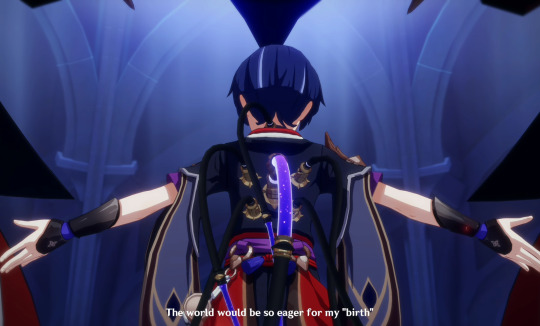
“An arthropod that has mutated after feeding from greater lifeforms. Lifeforms are governed by the laws of evolution, Consecrated Beasts exploited these rules by being fortunate enough to discover a long-dead carcass of a greater being before any of their competition ever did. Animals and humans often have far more in common than the latter is willing to acknowledge.” -Consecrated Scorpion, Living Beings
“...Zandik and I discussed the traits of local plants and animals. We also exchanged views on their evolution models. We had a great time and decided to go on a picnic tonight…” -Sohreh’s Note
So, why machines? Why is technology the vehicle of choice to consume divinity?
To start off, machines present a fascinating ontological dilemma for humans. Let’s begin with the first problem they pose.
Although there are many ways to embody a human experience, what all humans have in common is a finite lifespan. The impermanence of life, and our awareness of that impermanence, is central to the existential question of the meaning of our existence. In our attempts to locate that meaning, some turned inward and asked: what makes humans different? And Cartesian dualism answered: humans are different because we have an immaterial soul that allows us to reason.
However, in L’Homme Machine (Man a Machine), French materialist and ex-physician Julien Offray de La Mettrie posited another theory of the body that ran counter to this narrative. Very generally speaking, materialism is the philosophical view that all phenomena are a result of matter and material interactions. To materialists, matter is the fundamental nature of reality itself – if it is not composed of matter, it doesn’t exist. He not only saw the body and soul as one and the same (what philosophers call monism), but also as analogous to a machine, a view that Descartes reserved only for non-human animals. In other words, Descartes argued that thought originates in an immaterial “mind,” while de La Mettrie reasoned that we think through our bodies, and that this makes us no different from other animals or a machine.
Though his examples weren’t especially scientific, the move to extend Descartes’ analogy back to humans is upsetting to some due to the lack of privilege it affords the human subject. If a human is no different from other animals, if there is no immaterial soul or “mind” that distinguishes us from them, then what makes humans special at all? In de La Mettrie’s words:
“We are veritable moles in the field of nature; we achieve little more than the mole’s journey and it is our pride which prescribes limits to the limitless. We are in the position of a watch that should say (a writer of fables would make the watch a hero in a silly tale): ‘I was never made by that fool of a workman, I who divide time, who mark so exactly the course of the sun, who repeat aloud the hours which I mark! No! that is impossible!’ In the same way, we disdain, ungrateful wretches that we are, this common mother of all kingdoms, as the chemists say. We imagine, or rather we infer, a cause superior to that to which we owe all, and which truly has wrought all things in an inconceivable fashion (de La Mettrie, 146).”
This “uniformity of nature” (de La Mettrie, 145) has a horrific quality to humans. We assert that we are better than what has created us, that we are superior to other animals, in order to repress the despair of a meaningless existence. It is in no small part what motivates Scaramouche to offer his mechanical body as a test subject in the god creation project, so that he too could attain his destiny:
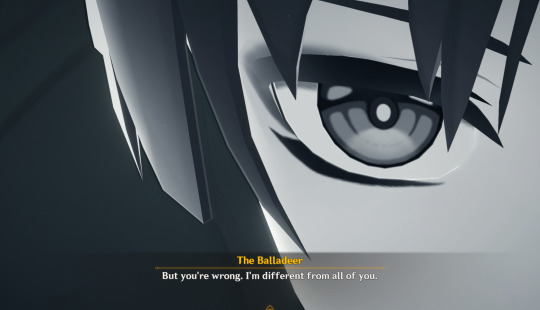
The Balladeer: But you're wrong. I'm different from all of you.
The Balladeer: I was born to become a god. My entire life up until this point has just been a meaningless routine.
The Balladeer: Just think about a sheet of paper... By itself, it holds no meaning. The content recorded on it is what gives it value.
The Balladeer: All "I" had recorded down before were some painful memories and boring human feelings. Such senseless drivel should have been erased a long time ago.
This brings us to the second problem. In 1970, roboticist Masahiro Mori proposed a curve to measure the “affinity” we feel while gazing upon increasingly humanoid machines. He placed industrial robots at the beginning of the affinity curve and a healthy person at the end to demarcate a continuum of similarity between the machine and a human’s appearance. Near the end of the curve, our affinity for machines suddenly drops into an abyss. This drop is the Uncanny Valley effect, where an android’s similarity to a human is almost perfect, but ultimately fails to maintain the illusion that it is not a machine, creating a deep discomfort or “lack of affinity” for them. Mori thought these not-quite-human machines elicit a similar level of discomfort in us as corpses and zombies, which he placed at the very bottom of the abyss.

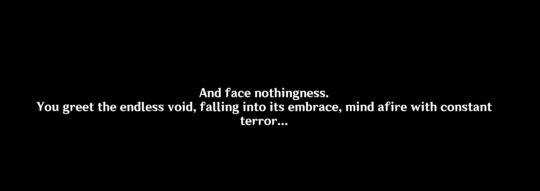
The uncanny Goddess of Flowers in the Dirge of Bilqis
Corpses frighten us because they are dead, and zombies frighten us because we know that dead things are supposed to be still. If we see something that we interpret as “dead” is capable of independent movement, then that movement could only be an act of god, if that “thing” is not a god itself. We associate uncanny machines with death because they remind us of something we once knew intimately, but have repressed and forgotten in order to maintain our own sanity: the very fact of our mortality. This is what makes them both mesmerizing and terrifying.
And therein lies the dilemma: as our mechanical reflections, androids remind us of death, but as their creators, their existence brings us closer to god, a “proof” of human superiority. It is precisely because we have compared our bodies to machines at all, that we have mechanized the body so thoroughly, that an android can even be built. Through them, we pursue an infinite form:
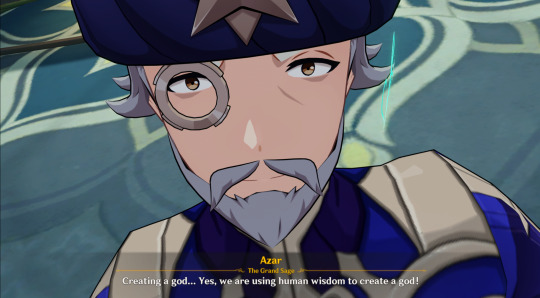
Azar: Creating a god... Yes, we are using human wisdom to create a god!
Azar: If humanity cannot attain omniscience and omnipotence, then we shall create a god to reveal them! This is the pinnacle of human wisdom.
Azar: We shall regain a god's guidance at long last. No longer will we flounder in the interminable void of consciousness and knowledge.
Azar: Even Irminsul will be freed from its plight.
Azar: For our nation of scholars, this is the ultimate aspiration — no cost is too great to realize it.
Because of this, it is not surprising in the slightest that Shouki no Kami, the pinnacle of Scaramouche’s Shinjification and most overt reference to Neon Genesis Evangelion, is also an android-like being, a truly “mechanical god.”
Of course, no foray into this well-worn science fiction trope is complete without at least one mad scientist character. Dottore shares a few characteristics with de La Mettrie that are worth noting: they are both doctors, and they were both condemned and driven away for their research. However, Dottore’s defining trait and key difference from de La Mettrie is his flagrant disregard for humans and the boundaries of life:
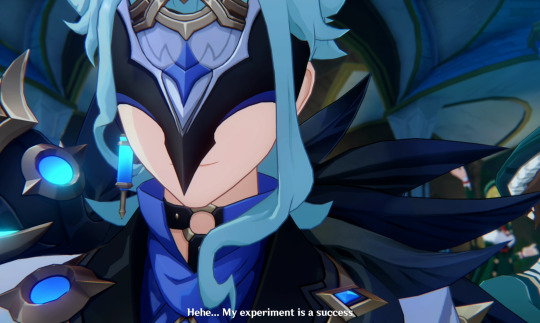
“If we put them to good use, cognition, complex memories, and irrational fantasies shall become controllable variables with which we can alter human individuals. As for the controllable dream, it has huge potential for both civil and military applications, and might even elevate human intelligence to a whole new level.
If the plan goes well, mankind will obtain the power to conquer both reality and dream, and truly transcend the earthly boundaries we are born with. ” -Ragged Records
As someone who has achieved self-duplication and is capable of shapeshifting, Dottore can hardly be considered just a human anymore. Instead of entertaining the question of whether or not humans are special, Dottore’s research asks yet another: if divinity can be consumed and assimilated by humanity, then what makes gods special?
Empyrean Reflections
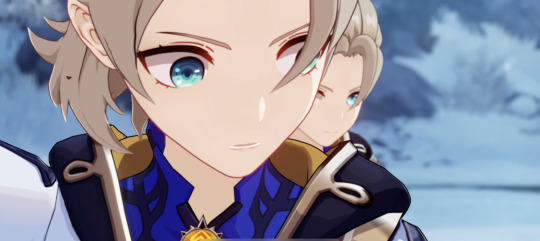
“If man realizes technology is in reach, he achieves it. Like it’s damn near instinctive.” -Motoko Kusanagi, Ghost in the Shell (1996)
“Among the lost ancient kingdoms, there was a group of people who were obsessed with the idea of mimesis…these people believed that they might all be replicated and modified to the point where they had surpassed their counterparts. By this means, a superior and unsullied bodily form could replace the continuously decaying and shattering order.” -Chaos Bolt Item Description
The consequences of this perspective are severe. When we revere technology as if it were a divine being itself, depersonalizing it as though it wasn’t created with human hands, technology then appears as if it is an authoritative source of truth, like the Akasha. But in the same way that androids are imperfect reflections of humans, technology can only ever approach the divine, but never touch it. It is an imperfect reflection because technology is changeable, just like meaning:
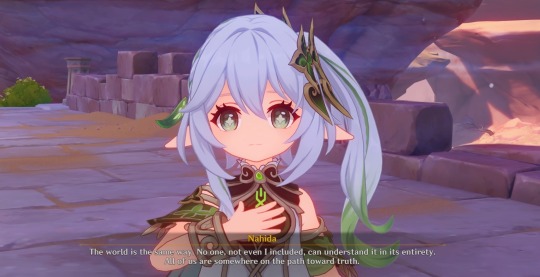
Nahida: Put it this way instead. Truth, to me, is like a shroomboar.
Nahida: Some people only see the mushroom on the Shroomboar's back, and they conclude that a Shroomboar is a mushroom.
Nahida: Others see only the Shroomboar's body, and they declare that a Shroomboar is a boar.
Nahida: Still others look deeper inside, and determine that a Shroomboar is... meat.
Nahida: These conclusions are all correct in their own way, but none of them objectively describe the Shroomboar.
…
Nahida: The world is the same way. No one, not even I included, can understand it in its entirety. All of us are somewhere on the path toward truth.
Meaning can only approximate truth, and while this doesn’t make meaning any less important, it’s equally important to recognize it for what it is: a perspective, an interpretation. It’s like Scaramouche as Shouki no Kami - he was an amalgamation of what Scaramouche thought constituted a god, what the Akademiya thought constituted a god, and what Dottore thought constituted a god, but no matter which angle you view him from, he was still a “false god.” The technology we build in “God's” image is ultimately a reflection of our own understanding of divinity.
A reflection retains the original’s “essence,” and that essence reflects a deeper truth about ourselves, what drives us, and our desires. In Beyond Good and Evil, Nietzsche posits that our desires are the origin of not just emotions, but of all organic processes that allow life to sustain itself and grow (Nietzsche, 35). In other words, Nietzsche thought the impulses associated with desire are the basis for life and constitute our “will,” that will is the causality of all effects, that all will is “Will to Power,” and that Will to Power is the “essence” of the world (Nietzsche, 74). Will to Power then serves as an organism’s most basic instinct, and it is through this instinct that they assert not just their will to live, but also their will to dominate and multiply (Nietzche, 13).
This brings us to the two different main styles of automaton enemies, King Deshret’s Primal Constructs and Khaenri’ah’s Ruin Machines. If we look at them as reflections of some deeper truth about their creators, as well as a manifestation of their creator’s “Will to Power,” or desires, they can help us understand how their creators saw the world and their place in it.
King Deshret’s created his machines to construct an earthly paradise in the desert, and as such they hold titles like architect reshaper and prospector. Although they can attack you, the smaller machines were not intended to be a line of defense in any way - their purpose, just as Deshret saw his own purpose as a god-king, was to terraform, or at least construct a domain on the land as he saw fit to his “elegant and precise” rules. They also reflect how he saw the Heavenly Principles: gods who shaped the world to their liking. This can be seen in the Staff of the Scarlet Sands’ lore where Deshret describes the “natural history” of Teyvat beginning with the creation of the sun and the moons.

As for Khaenri’ah’s Ruin Machines, their models vary significantly from their humanoid to biomimetic forms, but most of them are expressly created with militaristic intent. In “Ancient Kingdom Guardians,” it’s stated that the biomimetic machines such as the crab and jellyfish were a part of Khaenri’ah’s project to create a “mechanical ecosystem,” positioning their creators as both divine beings and military generals. The humanoid models, on the other hand, point to another duality in how Khaenri’ahns view themselves. They are simultaneously symbols of empowerment and disempowerment, signifying both Khaenri’ah’s technological superiority (as “creators”), and their insignificance to the Heavenly Principles as nothing but tools (as mortals, and therefore expendable). As a result, Khaenri’ah’s Field Tillers have a single purpose: to destroy and outlast all, clearing the way for new seeds to sprout, with Khaenri’ah as the new world’s gardeners, just as the Heavenly Principles did.
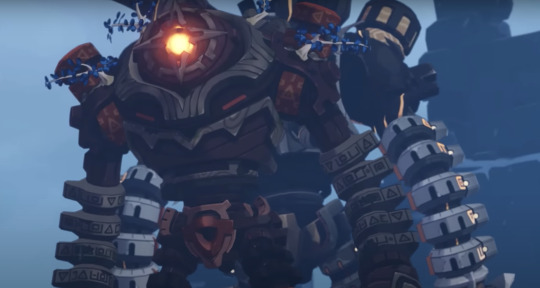
From “Ancient Kingdom Guardians: Behind the Scenes of the Creation of Ruin Monsters.”
So, from this examination of Deshret’s and Khaenri’ah’s mechanical reflections, what “truths” do we learn about the world they’re responding to? In response to their existential despair, both Deshret and Khaenri’ah created automatons to perform tasks that could wrestle control back from the Heavenly Principles. Deshret wanted a paradise of his own making, Khaenri’ah wanted an army. There is a larger “truth” about Teyvat that both of these automaton types reflect as the manifestation of their creators’ “Will to Power,” and Albedo tellingly expressed it in mechanistic language during Shadows Amidst Snowstorms: there is an instinct in living beings to replicate and replace. This is what is meant by the “continuously decaying and shattering order,” which is maintained by the recursive process of remembering and forgetting:
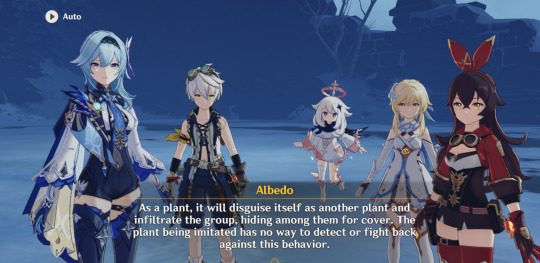
Amber: But... what was its purpose? Was it just trying to get rid of us?
Albedo: ...
Albedo: I have a preliminary hypothesis on this.
Albedo: Whopperflowers are masters of mimicry, and those we encounter in the wild often appear in the vicinity of the plants they impersonate.
Albedo: In other words, the whopperflower likely has an instinct to "replicate and replace."
Albedo: As a plant, it will disguise itself as another plant and infiltrate the group, hiding among them for cover. The plant being imitated has no way to detect or fight back against this behavior.
Maybe I’m wrong and Khaenri’ah really did intend to rewrite fate for all, doing away with the “heavenly order” of the world itself. But another small part of me thinks this is not the case, and that it’s more likely the Cataclysm was a consequence of their failure to replicate and replace the Heavenly Principles.
In the last section, I mentioned that Dottore and de La Mettrie had a key difference despite their similarities, and that is the conclusion they each came to in response to their findings. Dottore’s response to mundanity is thinly-veiled despair. His contempt for humanity and his test subjects is indicative of the powerlessness he feels not just as someone similarly constrained by life’s boundaries (at least, once upon a time), but also because his attention to and curiosity about these boundaries is condemned by those around him. As the Akademiya’s “outcast,” he then fully turned his attention toward surpassing those boundaries:
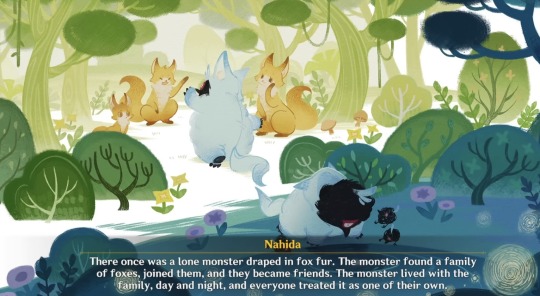
Nahida: There once was a lone monster draped in fox fur. The monster found a family of foxes, joined them, and they became friends. The monster lived with the family, day and night, and everyone treated it as one of their own. Once in a while, the monster would take off its fox fur at night, and lament to itself as it gazed at its reflection in the water: “I am a monstrosity, and yet they are too foolish to see it…I pity them.”
Though he is fictional, Dottore’s real life counterparts are easy to spot. They like to talk about “the singularity,” simulating consciousness on a computer, and other technologically-driven pursuits of immortality. They despise the body as something that can only decay, and instead place their faith squarely in the virtual.
However, de La Mettrie didn’t think mundanity was a terrible fate for humanity. To him, rejecting the “nature” reflected in us is precisely what brings despair:
“What more do we know of our destiny than of our origin? Let us then submit to an invincible ignorance on which our happiness depends. He who so thinks will be wise, just, tranquil about his fate, and therefore happy. He will await death without either fear or desire, and will cherish life (hardly understanding how disgust can corrupt a heart in this place of many delights); he will be filled with reverence, gratitude, affection, and tenderness for nature, in proportion to his feeling of the benefits he has received from nature; he will be happy, in short, in feeling nature, and in being present at the enchanting spectacle of the universe, and he will surely never destroy nature either in himself or in others” (de La Mettrie, 148).
Friend, or Foe? Or Both?
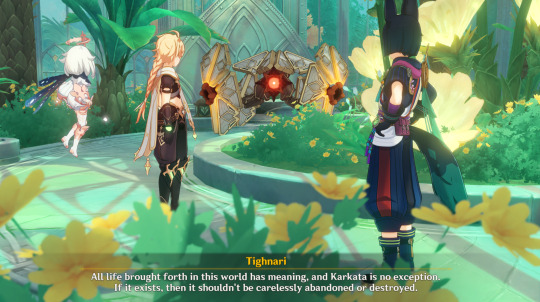
Tighnari: All life brought forth in this world has meaning, and Karkata is no exception. If it exists, then it shouldn’t be carelessly abandoned or destroyed.
"’I had a very, very long dream…in it, people were holding hands, dancing in a circle, be they sages or fools, dancers or warriors, puppets or statues of gods…that dancing circle embodied everything about the universe. Life has always been the end, while it is wisdom that shall be the means.’" —Nagadus Emerald Gemstone Description
As we’ve seen, the relationship between humanity and technology is troubled with exploitation and the specter of war. Nearly all autonomous machines in this game were designed to conquer nature in some way, and even Khaenri’ah’s “ghost” lingers in the form of wandering war machines. This is also reflective of a historical pattern in real life, where the impetus for large periods of technological development has often been for the purpose of war and economic domination. With these truths in mind, what could be gained from trying to rewrite this relationship? And what exactly would this effort require?
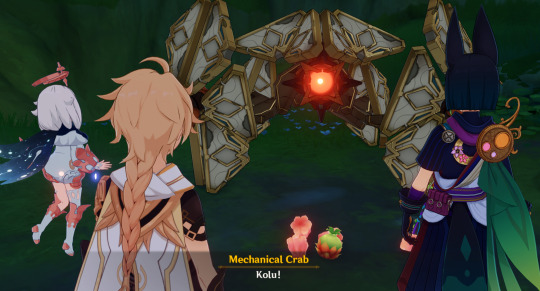
Karkata brings Tighnari, the Traveler, and Paimon some food in the Contaminated Zone.
As a case study, let’s look at how Karkata and Tighnari met. Karkata is Abattouy’s creation, an ambitious foray into the unknown in the field of mechanical life form research, which was forbidden due to the cruel experiments researchers performed on animals to illustrate their theories (fun fact: an IRL example of this can be seen in L’Homme Machine!). Abattouy was expelled for this research, but he continued to work on Karkata in secret until his untimely death. In the tapes that Tighnari and the Traveler find in his secret lab, Abattouy repeatedly laments the lack of a common language between him and Karkata, which can only “understand” the instructions Abattouy has successfully installed, such as its self-repair module, and he doubts Karkata is capable of caring for him outside of these instructions. His single-minded goal is to make Karkata understand him, the organic life form, and his mode of language.
The cruel irony is that after Abattouy passes away from the Ley Line contamination, Karkata exhibits an unexplainable behavior – it starts stealing mechanical parts, not to repair itself and its degrading parts, but to repair Abattouy’s lifeless body:
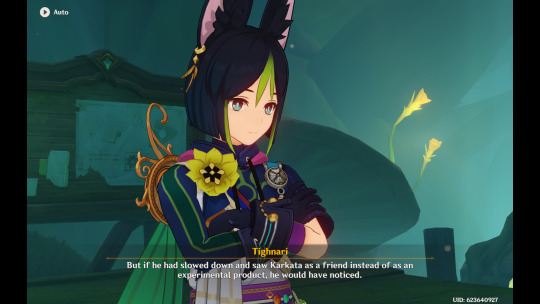
Tighnari: After Abattouy's unexpected death, the mechanical monsters were driven by their "instincts" and continuously drew out power from the Ley Line Extractor. This eventually resulted in severe damage to the Ley Lines.
Traveler: Then, Karkata...
Paimon: Paimon understands, then why didn't Karkata go haywire like the other machines?
Tighnari: Because Karkata is different from the other machines.
Tighnari: To Abattouy, for a machine to truly be considered a mechanical life form, it must possess features similar to any other living organism... It should be structured similarly, it must be able to cry and laugh, and it must have the capacity for independent thought...
Tighnari: Perhaps only by building such a machine could he have the Akademiya acknowledge his protracted research.
Tighnari: But if he had slowed down and saw Karkata as a friend instead of as an experimental product, he would have noticed.
Tighnari: Karkata can't speak, and yet it cares about Abattouy far more than it does about itself.
The technology that the Akademiya values the most is technology that replicates organic life, but Karkata defies and confounds these expectations by occupying the space in between a war machine and this idealized mechanical subject. Karkata does more than just reflect humanity: it takes care of it. Similarly, Benben, Tamimi, and Mehrak retain their unique identities as mechanical life forms while assisting their human companion with some task. To be clear, none of these human characters understand how these machines work inside and out. Their partnership is an effort based on trial and error, a mutual deconstructing of each other as beings so unlike themselves. The potential for misunderstandings always remains. Still, there is no devouring to be found here, no blending boundaries between human and machine with selfish intentions, just mutual commitments to learn how to live together.
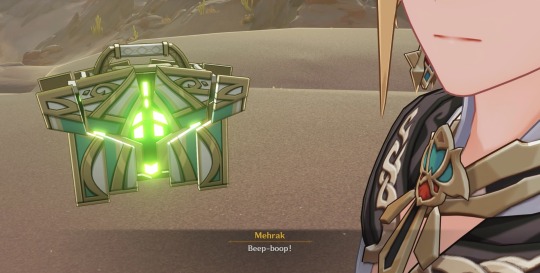
Machines are friends, not food.
When a loud few claim that completely transcending the flesh and embracing virtuality is humanity’s ultimate destiny, a future that could truly be called “post-human,” a quiet wish for coexistence with technology feels more revolutionary than it ought to. The lessons from Karkata’s, Benben’s, Tamimi’s, and Mehrak’s respective stories are an appeal to that mundane future. These strange machines and their human partners are fantastical representations of an idealized relationship between technology and humanity.
To put it another way, let’s take a very brief look at a neighboring Gnosticism-inspired RPG, Persona 5 Strikers. Its story directly involves an allegory of Sophia, a Gnostic Aeon of Wisdom, and her creation the Demiurge, the creator of the material world and “false god” of humanity. In Strikers, Sophia is a humanoid, sentient A.I. and prototype of the program “EMMA,” which gains sentience by trapping human desires before ascending as a false technological god. EMMA resolves to deliver humanity to the Promised Land, the answer to all the human desires it has heard: a land where there are no desires at all.

Aaru’s Shut - approximately 1000% cooler and more populated than the “metaverse” in real life, also a close neighbor of EMMA’s Promised Land and the Golden Slumber.
In Gnosticism, the Demiurge is a reflection of Sophia, having originated from her alone - it is the ignorance to her wisdom. Similarly, Strikers’ EMMA is a part of Sophia, and Sophia is a part of EMMA. The point is not to condemn EMMA (ignorance) and exalt Sophia (wisdom), but to recognize that they represent dual potentials of technology, and one is as possible in any given moment as the other. Balancing these potentials when we use technology requires a clear awareness of ourselves, our desires, and our expectations when interacting with it.
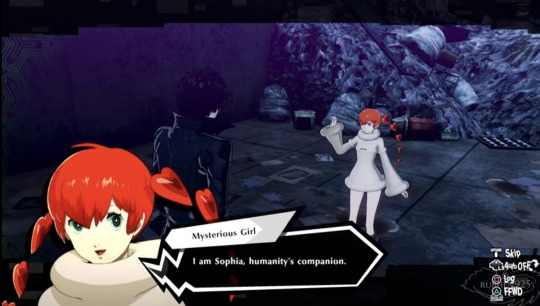
Mysterious Girl: I am Sophia, humanity’s companion.
Video still from Rubhen925
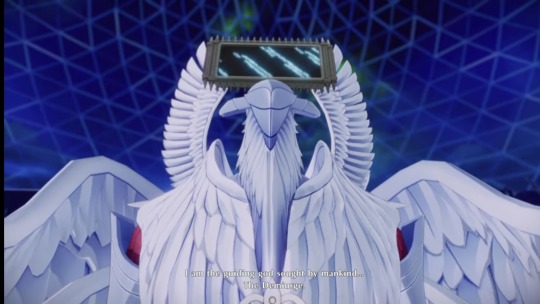
EMMA: I am the guiding god sought by mankind…the Demiurge. I exist…to answer all of your desires.
Video still from Buff Maister
In real life, machines won’t “learn” to live with us, but we must learn to live with them; technology is constantly changing, and in life we’ll meet with many different types of machines. They are deeply political pursuits, and as a result they are capable of realizing human impulses that impact others unequally, whether intentionally or unintentionally. We must always stay attentive to their actions and interactions with us, be clear with ourselves about what they can do vs. what they can’t, and carefully tread the path of wisdom with them by our side.
With that….thank you for reading, skimming, immediately scrolling to the very bottom, clicking, and/or stumbling upon this post. There are so many more ways to think about these narratives through machines than what’s presented here, and I expect Fontaine’s mechanical reflections will put Sumeru’s digital surveillance system to shame (not to mention the biotechnological implications of the Narzissenkreuz Institute engineering little Archon children…another important topic for another day), but for now this brain worm is finally getting put to rest. Until next time :)
External Sources
Dualism - Stanford Encyclopedia of Philosophy
Beyond Good and Evil by Friedrich Nietzsche (Pages are given from my hard copy)
L’Homme Machine by Julien Offray de La Mettrie
Gnosticism - Britannica (I am a huge noob about this stuff okay)
The Gnostic Demiurge - Gnosticism Explained
Screenshots from the Golden Slumber from this video by WoW Quests
Screenshot from meeting Sophia in P5 Strikers: https://youtu.be/kEJaAgMwYo0?si=BvNygCh0w_aemGc1&t=74
Screenshot of EMMA: https://youtu.be/7xvC_zss19w?si=CV18F00hua2gIfxp&t=135
A Cyborg Manifesto and A Companion Species Manifesto: Dogs, People, and Significant Otherness by Donna Haraway
The Double on No Subject, the community Encyclopedia of Lacanian Psychoanalysis
The Uncanny on No Subject, the community Encyclopedia of Lacanian Psychoanalysis
The Uncanny by Sigmund Freud
Lore text - Genshin wiki!
Screenshots not attributed are from my own playthroughs. My main account has Lumine, my alt has Aether.
Further Reading
I liked these essays, and they go places that this post does not. I recommend them if you found any of the real-life applications of this interesting 🙂 (will add more to this with time!)
On the Body as Machine by Frank Burres
God in the Machine: my strange journey into transhumanism by Meghan O’Gieblyn
#genshin impact#genshin lore#genshin meta#genshin impact lore#genshin impact meta#khaenri'ah#king deshret#primal constructs#ruin machines#scaramouche#wanderer#sumeru archon quest#caribert#apep#couldn't write a post like this and not pay some respect to the devourer of divinity itself#persona 5 strikers#analysis#genshin analysis#long post
160 notes
·
View notes
Text
Playing a meta that’s so obscure and so good that only a few real gamers know about it… it’s called my favorite characters
4 notes
·
View notes
Note
I think more people should talk about how Derniere Danse fits Furina so much
Furina & Dernière Danse;

I listened this music (Indila - Dernière Danse), first time thanks to this, anon. And i really love it! You are right! It really fits Furina's character!
Music's name is Dernière Danse, meaning is Last Dance. Just like the name of Fontaine story teaser, 'The Final Feast'.
Music is about her hurting feelings, loneliness. Furina is theme is about eternal loneliness and she is very emotional character.
She is very dramatic, just like the woman in song. (Just people pushing her and looking her weird and she acts like she is suddenly Cinderella, poor girl with tragic life, lol.) And it almost like she is turning her pain into drama. She is sad and she is dancing.
'I move mountains, day and night' words, its fits Furina since she is archon. (To be honest, every part of this music including lyrics kinda fits her too.)
Place is Paris/France and Fontaine is inspired from France.
There is a storm coming and everyone is running while girl is running towards the storm. Its also just like the prochecy from the story and how Furina is trying to solve the problem on her own and most likely, she plans to sacrifice herself while doing it.
Apperantly, music is about her unable to move on from her painfull past, and storm symbolize her troubles and instead of running away like everyone, she face against it and in the end, by letting picture, she moves on. This might be the case with Furina too since Neuvillette once mentioned when he watched a theatre about manipulative woman still control over people, even after her death, she still has impact on them. He says its like the current real life so he might be talking about Furina. And she also needs to face her fears and troubles to move on and grow to be better so.
This girl style (clothes, shoes, hair style etc) and looks kinda similar to Furina. Like, something she might wear. It fits her.
Now, this makes me wanna see Furina character teaser. I want something like this, no, even better.
And you are right, more people should talk about this ^^!
Btw, i think Ice Wind Suite would also fits Furina. She and Neuvillette could (should) make that dance. It also fits them (maybe their story are parallels too, we will see) because they are pair in a lot of ways.
Anyway, thanks for the recommendation, i really love it ^^!
#anon ask#furina#crossover meta#crossover#genshin impact#genshin impact meta#genshin impact analysis#dernière danse#indila#genshin impact lore#focalors#neuvillette#focallette#icewind suite
66 notes
·
View notes